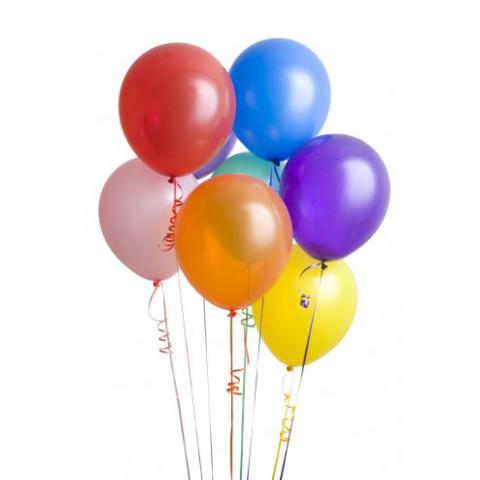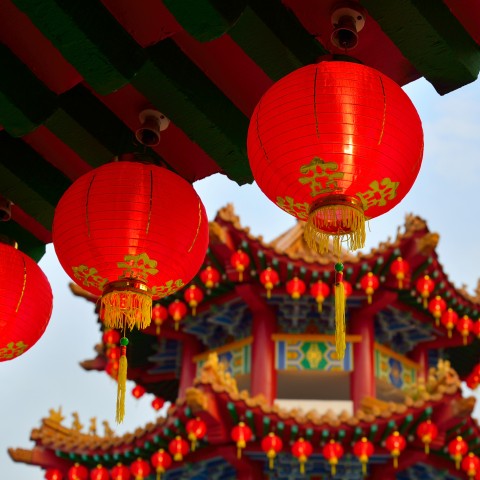
“I heard Chinese grammar is very difficult. Is it true?”
We often get this question from people who are attempting to learn Chinese.
Well, the answer is yes and no. Take Chinese sentence structure and word order for example. Making basic sentences with a subject, verb, and object is super-easy, just like in English. But when there are more elements involved, such as adverbs and time phrases, things get a little more complicated.
If you’re an absolute beginner who would like to experience the joy of forming a perfect Chinese sentence on your own, or if you’ve ever been frustrated with the placement of words in sentences, this article is for you!
 Table of Contents
Table of Contents
- Basic Chinese Language Word Order
- Advanced Sentence Structures
- The Golden Rule of Chinese Word Order
- Transforming a Sentence into a Question
- Sentence Building Exercises
- Conclusion
1. Basic Chinese Language Word Order

1.1 S + V + O
Chinese is an SVO language, like English and many other Romance languages.
Not sure what SVO is? Don’t worry. We’ll explain with a sample sentence.
| S (Subject) | V (Verb) | O (Object) |
|---|---|---|
| 我 | 喜欢 | 这个。 |
| Wǒ | xǐhuan | zhège. |
| I | like | this. |
S is for the subject. V is for the verb. O is for the object. The basic word order in Chinese is Subject + Verb + Object.
Let’s look at another SVO-structured sentence:
| S (Subject) | V (Verb) | O (Object) |
|---|---|---|
| 我 | 在学 | 中文。 |
| Wǒ | zài xué | Zhōngwén. |
| I | at (am) study(ing) | Chinese. |
Note: Since Chinese verbs don’t conjugate, some “aid words” will be added to indicate tense. For example, to express an action that’s in progress, as in the example above, we use the word 在 (zài), meaning “at,” plus a verb. We can view 在学 (zài xué), or “at study,” as the verb phrase “to be studying.”
1.1.1 Exceptions
Granted that the Chinese language is pretty flexible, there are cases—especially in colloquial language—where we can bend the SVO rule a little.
For example, when the object or subject is clear to the audience, they can be omitted.
The subject in the following sentence is omitted.
| V | O |
|---|---|
| 是 | 我。 |
| shì | wǒ. |
| (It) is | me. |
The object in the following sentence is omitted.
| S | V |
|---|---|
| 我 | 喜欢。 |
| Wǒ | xǐhuan. |
| I | like (it). |
When special attention needs to be brought to the object, it can even be put at the beginning of a sentence.
| O | S | V |
|---|---|---|
| 这个 | 我 | xǐhuan. |
| Zhège | wǒ | xǐhuan. |
| This | I | like. |
2. Advanced Sentence Structures
Don’t you wish the world was as simple as an SVO sentence? Well, even sentences get sophisticated with packed information, like “where,” “when,” “how,” and so on.
One common mistake that beginners make concerning the word order of Chinese sentences is that they tend to put the phrases with extra information at the end. However, this is often not the correct way of forming the sentence.
2.1 S + Place + V + O
Phrases suggesting the location should go BEFORE the verb.
1)
| S | Place | V | O |
|---|---|---|---|
| 我 | 在家 | 学 | 中文。 |
| Wǒ | zài jiā | xué | Zhōngwén. |
| I | at home | study | Chinese. |
2)
| S | Place | V |
|---|---|---|
| 他们 | 在门外 | 聊天。 |
| Tāmen | zài ménwài | liáotiān. |
| They | outside the door | chat. |
Note: Sample sentence 2) doesn’t have an object. Verbs like 聊天 (liáotiān) are composed of an action verb and a complement which can be considered the object. In this case, 聊 is the action verb and 天 is the complement.
2.1.1 Exceptions
However, location phrases are used AFTER a verb in some rare cases with certain verbs. These special verbs include:
- 坐 (zuò), “to sit”
- 站 (zhàn), “to stand”
- 走 (zǒu), “to walk”
- 住 (zhù), “to live”
- 留 (liú), “to stay”
- 停 (tíng), “to park”
- 放 (fàng), “to put”
These verbs usually indicate motion towards something. The location phrases serve as a complement explaining where the action leads to.
With these special verbs, the order is S + Special Verb + Place.
| English Meaning | S + Special Verb + Place | Note |
|---|---|---|
| “Put the suitcase on top.” | 行李箱放上面。✓ Xínglǐ xiāng fàng shàngmian. Literal translation: “Suitcase (should be) put on top.” 行李箱上面放。x Xínglǐ xiāng shàngmian fàng. | The location phrase 上面 (shàngmian), or “on top,” is where the action 放 (fàng), meaning “to put,” is supposed to happen next. So 上面 (shàngmian) is used after 放 (fàng). |
| “You walk on the left side.” | 你走左边。✓ Nǐ zǒu zuǒbiān. Literal translation: “You walk left side.” 你左边走。x Nǐ zuǒbiān zǒu. | 左边 (zuǒbiān), or “on the left side,” is where the speaker wants the listener to walk. Therefore, it’s 走左边 (zǒu zuǒbiān), or “walk on the left side,” rather than 左边走, or “left side walk.” |
| “I live in Beijing.” | 我住北京。✓ Wǒ zhù Běijīng. Literal translation: “I live Beijing.” 我北京住。x Wǒ Běijīng zhù. | Other than 我住北京 (Wǒ zhù Běijīng), you can also say 我住在北京。(Wǒ zhù zài Běijīng.) Literally, it means “I live in Beijing. |
2.2 S + Time + V + O
Just like place phrases, time phrases also go BEFORE the verb.
As we learned a little earlier, 在 (zài), meaning “at,” is used to indicate the progressive tense. Besides that, time phrases can also be used to make a sentence more explicit. For example, 现在 (xiànzài), meaning “now,” is often used when something is happening at the moment.
| S | Time | V (at + V = V-ing) | O |
| 我 | 现在 | 在学 | 中文。 |
| Wǒ | xiànzài | zài xué | Zhōngwén. |
| I | now | at (am) study(ing) | Chinese. |
For things that happened in the past, we can use the “aid word” 了 (le) to indicate the past tense. There are many other time phrases you can include, such as:
- 昨天 (zuótiān), “yesterday”
- 上个礼拜 (shàngge lǐbài), “last week”
- 去年 (qùnián), “last year”
| S | Time | V ( V + 了 = V-ed) | O |
| 我 | 昨天 | 学了 | 中文。 |
| Wǒ | zuótiān | xué le | Zhōngwén. |
| I | yesterday | studied | Chinese. |
Note that the time phrases we talk about here refer to a specific point in time, answering the question “When?” They do not refer to a “time period,” which would answer “For how long?” When the duration of time is involved, it’s another long story.
Also, if special attention needs to be brought to the time, these time phrases can be placed at the beginning of a sentence. For example, we can say 现在我在学中文 (Xiànzài wǒ zài xué Zhōngwén) to tell someone “Right now, I’m learning Chinese.”
2.3 S + Manner + V + O
Manner is often described using adverbs that tell “how” the action happens. Like time and place words, they also go BEFORE the verb.
1)
| S | Manner | V | O |
| 我 | 非常 | 喜欢 | 这个。 |
| Wǒ | fēicháng | xǐhuan | zhège. |
| I | extremely | like | this. |
2)
| S | Manner | V | O |
| 我 | 开心地 | 学 | 中文。 |
| Wǒ | kāixīn de | xué | Zhōngwén. |
| I | happily | study | Chinese. |
2.4 S + Instrument + V + O
Instrument here is the equivalent of “by…” or “with…” in English, describing the tool or method used for the action. As you may have guessed, they also go BEFORE the verb.
| S | Instrument | V | O |
| 我 | 用手机 | 学 | 中文。 |
| Wǒ | yòng shǒujī | xué | Zhōngwén. |
| I | by using my phone | study | Chinese. |
Here comes a question: When there’s more than one “BEFORE the verb” element in a sentence, what are the Chinese word order rules? For example, when there’s time, place, manner, and instrument at the same time, how should you arrange them?
Here’s an example:
我昨天开心地在家用手机学中文。
Wǒ zuótiān kāixīn de zàijiā yòng shǒujī xué Zhōngwén.
Word-by-word translation: “I yesterday happily at home by using the phone studied Chinese.”
As you can see, the word order in this sentence is:
S + Time + Manner + Place + Instrument + V + O
This is the most common and natural order of words. Of course, when certain things need to be emphasized, they could be brought to the front of the sentence. Even though it’s very rare to use all of the above elements in one sentence in a real-life conversation, it’s good for a Chinese learner to know the proper way to arrange them.
3. The Golden Rule of Chinese Word Order
(smiley cartoon person under golden sun)
At this point, a pattern in Chinese sentence structure seems to be getting more clear. The descriptive part always goes first, such as 开心地学中文 (kāixīn de xué Zhōngwén), meaning “happily study Chinese,” 用手机学中文 (yòngshǒujī xué Zhōngwén), meaning “using the phone to study Chinese,” and 在家学中文 (zài jiā xué Zhōngwén), meaning “at home study Chinese.”
Even though there are a handful of exceptions, as we mentioned earlier, as a general rule:
Modifiers go before the modified.
Not only does the golden rule apply to verbs, but also to nouns.
For example, 红色的行李箱 (hóngsè de xínglǐ xiāng) means “red suitcase.” 红色 (hóngsè), or “red,” modifies 行李箱 (xínglǐ xiāng), meaning “suitcase.” So 红色 (hóngsè) goes before 行李箱 (xínglǐ xiāng).
放在上面的行李箱 (fàngzài shàngmiàn de xínglǐ xiāng) translates as “the suitcase that’s put on top.” The noun 行李箱 (xínglǐ xiāng), or “suitcase,” still comes after the modifying phrase 放在上面 (fàngzài shàngmiàn), or “to put on top.”
4. Transforming a Sentence into a Question
Finally, we’ll be looking into how to form questions in Chinese. You may be surprised how easy it is!
4.1 Yes-or-No Questions
(woman holding cards with no and yes)
Questions that are answered with a “yes” or “no” can be referred to as yes-or-no questions. So, what’s the word order in Chinese sentences after transforming them into such a question?
To form a yes-or-no question, all you need is the particle 吗 (ma), which turns a sentence into a question.
Examples:
| Sentence | + 吗 | ⇒ Question |
| 你喜欢这个。 Nǐ xǐhuan zhège. “You like this.” | +吗? | 你喜欢这个吗? Nǐ xǐhuan zhège ma? “Do you like this?” |
| 他在学中文。 Tā zài xué Zhōngwén. “He’s studying Chinese.” | +吗? | 他在学中文吗? Tā zài xué Zhōngwén ma? “Is he studying Chinese?” |
| 她不住北京。 Tā bú zhù Běijīng. “She doesn’t live in Beijing.” | +吗? | 她不住北京吗? Tā bú zhù Běijīng ma? “Doesn’t she live in Beijing?” |
4.2 Forming Other Questions
To form other types of questions, it only takes three steps.
Step 1: Think about how you would answer the question in a complete sentence.
Step 2: Find the question word you need.
(question words in English)
Step 3: Replace the part you’re asking about with the question word.
Oh wait, don’t forget to change the period to a question mark!
Examples:
| Sentence | Question Word | ⇒ Question |
| 你喜欢这个。 Nǐ xǐhuan zhège. “You like this.” | 什么 shénme “what” | 你喜你喜欢什么? Nǐ xǐhuan shénme? “What do you like?” |
| 她明天去北京。 Tā míngtiān qù Běijīng. “She is going to Beijing tomorrow.” | 什么时候 shénme shíhou “when” | 她什么时候去北京? Tā shénme shíhou qù Běijīng? “When is she going to Beijing?” |
| 我在学中文。 Wǒ zài xué Zhōngwén. “I’m studying Chinese.” | 谁 shéi “who” | 谁在学中文? Shéi zài xué Zhōngwén? “Who is studying Chinese?” |
| 他们在门外聊天。 Tāmen zài ménwài liáotiān. “They’re chatting outside the door.” | 哪里 nǎlǐ “where” | 他们在哪里聊天? Tāmen zài nǎlǐ liáotiān? “Where are they chatting?” |
What a confidence booster, right?
Be sure to visit our website to check out the top 25 Chinese questions you need to know.
5. Sentence Building Exercises
Now it’s time for some Chinese word order practice! Try out the new Chinese grammar skills you’ve just gained from reading this article.
Here are your building blocks:
| Subject: 你 (nǐ), “you” |
| Verb: 喝 (hē), “to drink” |
| Object: 水 (shuǐ), “water” |
| Place: 在教室 (zài jiàoshì), “in the classroom” |
| Time: 五点 (wǔdiǎn), “five o’clock” |
| Manner: 偷偷地 (tōutōude), “secretly” |
| Instrument: 用碗 (yòng wǎn), “with a bowl” |
| Modifier: 冰 (bīng), “ice-cold” |
| Question Word: 什么 (shénme), “what” |
Your building task is to make Chinese sentences from the English translations on the left side. If you like, use the hint in the middle. Put your answers on the right side.
| English | Hint | Answer |
| “You drank water.” | S + V + O | |
| “You drank water in the classroom at five.” | S + Time + Place + V + O | |
| “You secretly drank water with a bowl.” | S + Manner + Instrument + V + O | |
| “You drank ice-cold water at five o’clock.” | S + Time + Verb + Modifier + O | |
| “Did you drink water?” | S + V + O + 吗? | |
| “What did you drink?” | S + V + Question Word? |
(No peeking until you’re done!)
(hourglass indicating time is up)
Good job! Now you can check your answers.
| English | Hint | Answer |
| “You drank water.” | S + V + O | 你喝了水。 Nǐ hē le shuǐ. |
| “You drank water in the classroom at five.” | S + Time + Place + V + O | 你五点在教室喝了水。 Nǐ wǔdiǎn zài jiàoshì hē le shuǐ. |
| “You secretly drank water with a bowl.” | S + Manner + Instrument + V + O | 你偷偷地用碗喝了水。 Nǐ tōutōude yòng wǎn hē le shuǐ. |
| “You drank ice-cold water at five o’clock.” | S + Time + Verb + Modifier + O | 你五点喝了冰水。 Nǐ wǔdiǎn hē le bīngshuǐ. |
| “Did you drink water?” | S + V + O + 吗? | 你喝了水吗? Nǐ hē le shuǐ ma? |
| “What did you drink?” | S + V + Question Word? | 你喝了什么? Nǐ hē le shénme? |
6. Conclusion
Now, if I ask YOU the question from the beginning of this article, what would your answer be?
“Is Chinese grammar difficult?”
中文的语法难吗?
Zhōngwén de yǔfǎ nán ma?
Whether your answer is yes or no, I hope this article will at least provide you with a better understanding of Chinese syntax and gives you more confidence when interacting with native Chinese speakers. This is what ChineseClass101.com was designed for.
If you haven’t subscribed to our weekly updated lessons created by our experienced Chinese teachers, you’re missing out on a lot of great Chinese learning resources! Go to ChineseClass101.com and get a free lifetime account today!

The Ultimate Guide on How to Tell Time in Chinese

As a Chinese language-learner, one of the things you likely wonder about often is how to tell time in Chinese. Everything we do is seamlessly associated with time. We consume time every day and are always in a running competition with it. We care about time, and time has become one of the most important topics in our everyday lives. It’s important to stay on track with what you do, no matter where you are; further, you should do your best to be on time for certain events. This is why time in Chinese culture plays a big role.
“Time” in Chinese is 时间 (shí jiān). The rules for telling the time in Mandarin Chinese are all straightforward and simple to follow, so let go of your fears and proceed with confidence.
With ChineseClass101.com, learning time in Chinese is fun and effective at the same time!
 Table of Contents
Table of Contents
- How to Ask for the Time
- The Hours in Chinese
- The Minutes in Chinese
- Hours Divided into Minutes
- General Time References of the Day
- Chinese Time Adverbs
- Common Phrases Regarding Time
- Bonus: Proverbs and Sayings
- Conclusion
1. How to Ask for the Time
You need to always keep track of your own time.

- In Chinese: 现在几点了?
Pinyin: Xiàn zài jǐ diǎn le.
In English: What time is it?
- In Chinese: 请问你知道现在的时间吗?
Pinyin: Qǐng wèn nǐ zhī dào xiàn zài de shí jiān ma?
In English: Do you have the time, please?
- In Chinese: 请问[会议]是什么时候?
Pinyin: Qǐng wèn [huì yì] shì shí me shén hou?
In English: What time is the [meeting]?
Feel free to replace the event in the brackets with any other event.
2. The Hours in Chinese
Can you express the time in Chinese precisely?
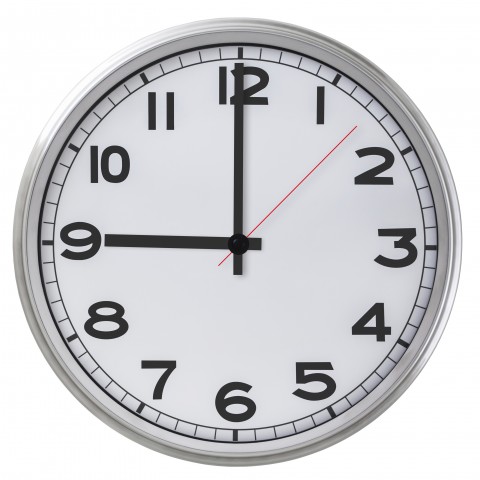
In China, people are used to the twenty-four-hour clock. In order to master telling the time in Mandarin Chinese, let’s get to know these two important vocabulary words first:
- 小时 (xiǎo shí) — hour
- 点钟 (diǎn zhōng) — o’clock
As we mentioned above, “hour” in Chinese is 小时 (xiǎo shí), and 钟头 (zhōng tóu) is another way to say “hours” in daily conversation; it’s less formal than 小时 (xiǎo shí).
However, to make it more convenient for speech, we usually just say the simplified version of 点钟 (diǎn zhōng), which is 点 (diǎn).
Now, how do you say the time in Chinese exactly? Easy.
To express any hour, all you need to do is say the number first and add 点 (diǎn) / 点钟 (diǎn zhōng) right after. For example, four o’clock would be 四点 (sì diǎn) / 四点钟 (sì diǎn zhōng).
Here’s a list of time words in Chinese that will help you understand how the twenty-four-hour clock works:
- 一点钟 (yī diǎn zhōng) — 1 o’clock
- 两点钟 (liǎng diǎn zhōng) — 2 o’clock
- 三点钟 (sān diǎn zhōng) — 3 o’clock
- 四点钟 (sì diǎn zhōng) — 4 o’clock
- 五点钟 (wǔ diǎn zhōng) — 5 o’clock
- 六点钟 (liù diǎn zhōng) — 6 o’clock
- 七点钟 (qī diǎn zhōng) — 7 o’clock
- 八点钟 (bā diǎn zhōng) — 8 o’clock
- 九点钟 (jiǔ diǎn zhōng) — 9 o’clock
- 十点钟 (shí diǎn zhōng) — 10 o’clock
- 十一点钟 (shí yī diǎn zhōng) — 11 o’clock
- 十二点钟 (shí èr diǎn zhōng) — 12 o’clock
- 十三点钟 (shí sān diǎn zhōng) — 13 o’clock
- 十四点钟 (shí sì diǎn zhōng) — 14 o’clock
- 十五点钟 (shí wǔ diǎn zhōng) — 15 o’clock
- 十六点钟 (shí liù diǎn zhōng) — 16 o’clock
- 十七点钟 (shí qī diǎn zhōng) — 17 o’clock
- 十八点钟 (shí bā diǎn zhōng) — 18 o’clock
- 十九点钟 (shí jiǔ diǎn zhōng) — 19 o’clock
- 二十点钟 (èr shí diǎn zhōng) — 20 o’clock
- 二十一点钟 (èr shí yī diǎn zhōng) — 21 o’clock
- 二十二点钟 (èr shí èr diǎn zhōng) — 22 o’clock
- 二十三点钟 (èr shí sān diǎn zhōng) — 23 o’clock
- 二十四点钟 (èr shí sì diǎn zhōng) — 24 o’clock
- 零点 (líng diǎn) — 0 o’clock
Usage in a sentence:
In Chinese: 现在是16点钟。
Pinyin: Xiàn zài shì shí liù diǎn zhōng.
In English: It’s 4 PM.
Additional Notes:
Remember that when referring to time and currency, 两 (liǎng) is used for “two” instead of 二 (èr), which is used more commonly for counting.
3. The Minutes in Chinese

分钟 (fēn zhōng) is one of the most important time words in Chinese, meaning “minute.” Usually, people simplify it and just say 分 (fēn), which means the same thing. To express any specific minute at any hour, you just need to follow this formula: [number] “点 (diǎn) / 点钟 (diǎn zhōng)” + [number] “分 (fēn).”
Usage in a sentence:
In Chinese: 现在是三点十八分。
Pinyin: Xiàn zài shì sān diǎn shí bā fēn.
In English: It’s 3:18 right now.
4. Hours Divided into Minutes
点半 (diǎn bàn) – half
Structure:
In Chinese: 现在的时间是[点钟数字] 点 + 分钟
In English: It’s [number of the clock] o’clock + minutes
Usage in a sentence:
In Chinese: 现在的时间是三点半。
Pinyin: Xiàn zài de shí jiān shì sān diǎn bàn.
In English: It’s half past three now.
一刻 (yī kè) – quarter
Usage in a sentence:
In Chinese: 现在的时间是五点一刻。
Pinyin: Xiàn zài de shí jiān shì wǔ diǎn yī kè.
In English: It’s a quarter past five right now.
5. General Time References of the Day

What if you just want to give an approximate time in Chinese? Here are some words you can use to tell someone a general time of day.
- 早晨 (zǎo chén) — early morning
- 日出 (rì chū) — sunrise
- 下午 (xià wǔ) — afternoon
- 晚上 (wǎn shàng) — evening
- 中午 (zhōng wǔ) — noon
- 日落 (rì luò) — sunset
- 夜里 (yè lǐ) — at night
- 半夜 (bàn yè) — midnight
- 凌晨 (líng chén) — before dawn
Usage in a sentence:
In Chinese: 我喜欢在[下午]的时候吃水果。
Pinyin: Wǒ xǐ huan zài [xià wǔ] de shí hou chī shuǐ guǒ.
In English: I like to eat fruit in the afternoon.
Additional Notes:
Feel free to replace the example time reference in the brackets with any of the other time words in Chinese above. You can also check out our article regarding dates in Chinese here.
6. Chinese Time Adverbs
Remember to arrange your time wisely.

Time adverbs in Chinese can help you communicate with more-detailed and complete sentences. Here are the most common ones.
现在 (xiàn zài) – right now
Usage in a sentence:
In Chinese: 抱歉,我现在很忙,待会给你回电话。
Pinyin: Bào qiàn, wǒ xiàn zài hěn máng, dāi huì gěi nǐ huí diàn huà.
In English: Sorry, I am very busy right now. I will call you back in a bit.
目前 (mù qián) – currently
Usage in a sentence:
In Chinese: 我目前正在专心复习考试。
Pinyin: Wǒ mù qián zhèng zài zhuān xīn fù xí kǎo shì.
In English: Currently, I am focusing on reviewing the exam.
同时 (tóng shí) – meanwhile / at the same time
Usage in a sentence:
In Chinese: 我可以同时出色地完成很多件事。
Pinyin: Wǒ kě yǐ tóng shí chū sè de wán chéng hěn duō jiàn shì.
In English: I can multitask very well.
之前 (zhī qián) – before
Usage in a sentence:
In Chinese: 每次睡觉之前,我都喜欢阅读一会。
Pinyin: Měi cì shuì jiào zhī qián, wǒ dōu xǐ huan yuè dú yī huì.
In English: Every time before I go to sleep, I like to read for a little while.
之后 (zhī hòu) – after
Usage in a sentence:
In Chinese: 我习惯在吃饭之后喝一杯果汁。
Pinyin: Wǒ xí guàn zài chī fàn zhī hòu hē yī bēi guǒ zhī.
In English: I am used to drinking a cup of juice after a meal.
很快 (hěn kuài) – soon
Usage in a sentence:
In Chinese: 我很快就可以帮你辅导作业了。
Pinyin: Wǒ hěn kuài jiù kě yǐ bāng nǐ fǔ dǎo zuò yè le.
In English: I will be helping you with your homework soon.
立刻 (lì kè) – immediately
Usage in a sentence:
In Chinese: 每次收到短信,我都会立刻回复。
Pinyin: Měi cì shōu dào duǎn xìn, wǒ dōu huì lì kè huí fù.
In English: Every time I receive a message, I reply immediately.
差不多 (chà bu duō) – almost
Usage in a sentence:
In Chinese: 我差不多快到了。
Pinyin: Wǒ chà bu duō kuài dào le.
In English: I am almost there.
过一会儿 (guò yī huìr) – in a little while
Usage in a sentence:
In Chinese: 他过一会儿就会回来了。
Pinyin: Tā guò yī huìr jiù huì huí lái le.
In English: He will be back in a little while.
很久 (hěn jiǔ) – for a long time
Usage in a sentence:
In Chinese: 我们曾经做了很久的好朋友。
Pinyin: Wǒ men céng jīng zuò le hěn jiǔ de hǎo péng you.
In English: We were good friends for a long time.
任何时候 (rèn hé shí hou) – any time
Usage in a sentence:
In Chinese: 在任何时候,只要你需要我,我就会陪在你身边。
Pinyin: Zài rèn hé shí hou, zhī yào nǐ xū yào wǒ, wǒ jiù huì péi zài nǐ shēn biān.
In English: I will be with you at any time as long as you need me.
尽快 (jìn kuài) – as soon as possible
Usage in a sentence:
In Chinese: 我尽快把邮件发给你。
Pinyin: Wǒ jìn kuài bǎ yóu jiàn fā gěi nǐ.
In English: I will send you the email as soon as possible.
Additional Notes:
Usually, adverbs are added to the beginning of a sentence, after the subject.
7. Common Phrases Regarding Time
It can be tough to catch up with time sometimes!
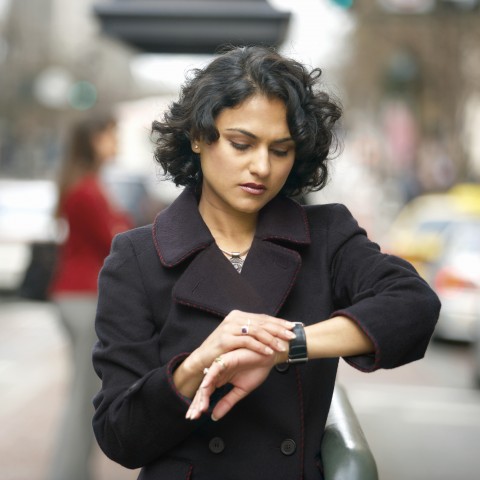
时间 (shí jiān), which is “time” in Chinese, can be tight and precious, or hard to manage. Time in Chinese culture is always an important topic to discuss as our everyday arrangements depend on it. Sometimes we have to apologize for being late, and sometimes we just want to ask other people to be on time. Here are some of the most common phrases for talking about time in Chinese that will certainly help you communicate with others.
- In Chinese: 赶紧的!
Pinyin: Gǎn jǐn de!
In English: Hurry up!
- In Chinese: 抱歉,我迟到了。
Pinyin: Bào qiàn, wǒ chí dào le.
In English: Sorry that I’m late.
- In Chinese: 我现在就出发。
Pinyin: Wǒ xiàn zài jiù chū fā.
In English: I will be going right now.
- In Chinese: 以防堵车,我打算提前半小时出发。
Pinyin: Yǐ fáng dǔ chē, wǒ dǎ suàn tí qián bàn xiǎo shí chū fā.
In English: Just in case there’s traffic, I plan to leave thirty minutes early.
- In Chinese: 请提前到达集合地点。
Pinyin: Qǐng tí qián dào dá jí hé dì diǎn.
In English: Please arrive early at the meeting place.
- In Chinese: 请准时到。
Pinyin: Qǐng zhǔn shí dào.
In English: Please be on time.
8. Bonus: Proverbs and Sayings
We should always cherish the time no matter what.

Here are some proverbs and idioms about time in Chinese that will help you sound like a native speaker.
- In Chinese: 时间就是金钱。
Pinyin: Shí jiān jiù shì jīn qián.
In English: Time is money.
- In Chinese: 一寸光阴一寸金,寸金难买寸光阴。
Pinyin: Yī cùn guāng yīn yī cùn jīn, cùn jīn nán mǎi cùn guāng yīn.
In English: An inch of gold will not buy an inch of time, and you can’t buy an inch of time with an inch of gold.
- In Chinese: 时间会治愈一切。
Pinyin: Shí jiān huì zhì yù yī qiē.
In English: Time heals all wounds.
- In Chinese: 时光飞逝。
Pinyin: Shí guāng fēi shì.
In English: Time flies.
9. Conclusion

Now, I hope you’ve mastered the art of how to tell time in Chinese. If you’re a Chinese language-learner who’s full of curiosity and a desire to learn more, then our online lessons will be just perfect for a diligent individual like you. Visit ChineseClass101.com today to acquire a once-in-your-lifetime Chinese learning experience!
Before you go, let us know in the comments how you feel about telling the time in Chinese now. To practice, tell us what time it is where you are, in Chinese! 🙂 We look forward to hearing from you.

National Single’s Day in China

Holidays are one of the most essential embodiments of a region’s culture. Some traditional holidays have brewed throughout history, while some modern holidays are indicating the new emerging facets of culture. If you’re a Chinese language learner, you must have heard of some traditional Chinese holidays such as the Chinese New Year. However, today we’re going to introduce an off-the-beaten-path holiday called Singles’ Day.
What? You’ve only heard of Valentine’s Day? Well, now you’re going to open your eyes. China’s Singles’ Day became a fad in recent years, originally in an attempt to celebrate single people. Now, it has evolved into a big shopping holiday.
Want to know more about it? No problem. We’ve got everything you need here about China’s Singles’ Day!
 Table of Contents
Table of Contents- How Did Singles’ Day Start?
- How Did it Become a Shopping Festival?
- Singles’ Day Vocabulary
- Conclusion
1. How Did Singles’ Day Start?

Tired of being jealous of people who can celebrate Valentine’s Day? Now it’s single people’s turn!
Singles’ Day in Chinese is 光棍节 (guāng gùn jié), which literally means “single stick day.” It’s a single-awareness day among young Chinese people. This non-official national Singles’ Day originated from college students at Nanjing University in 1993 in an attempt to celebrate their pride in singledom as opposed to being part of a couple on Valentine’s Day.
So when is Chinese Singles’ Day? Because the date 11/11 resembles four single sticks that indicate being solitary, November 11th was agreed to be the proper Singles’ Day.
Interestingly, it has become trendy for many young people to confess their feelings for people they like on Singles’ Day! Guess why? Because if it ever works out, then they can finally end their journey of being single exactly on Singles’ Day and start a romantic date right after!

2. How Did it Become a Shopping Festival?
Singles’ Day has now been transformed from an “anti-Valentine’s Day” into the biggest online shopping day worldwide. This idea was triggered by Alibaba back in 2009 and people have embraced it ever since. The Chinese Singles’ Day Alibaba paved the way for also encourages single people’s inner pride by providing them with such perks.
A version of Alibaba’s Singles’ Day, also known as the Double Eleven Shopping Day, was created by offering prodigious discounts for twenty-four hours mainly through Alibaba-operated platforms such as Taobao, as well as some other big competitors that integrated Alibaba’s idea. It’s much like American’s Black Friday, but the Singles’ Day shopping festival is more E-commerce-focused and has a larger scale due to the huge Chinese population.
Now you know why many people can’t wait for the exciting Double Eleven Shopping Day to clean their cart and buy all of their favorite products they’ve been waiting a long time for! If you ever want to get these good deals on China’s Singles’ Day, remember to have some good Wi-Fi service and try to get your desired items exactly at the time the sale starts. Otherwise, your website may crash due to the large demand and you’ll end up getting nothing!
3. Singles’ Day Vocabulary

1- Words about Relationships
Single dog – 单身狗 (dān shēn gǒu)
Meaning: Someone who is single and sad
Usage in a sentence:
In Chinese: 我今年还是一只单身狗。
Pinyin: Wǒ jīn nián hái shì yī zhī dān shēn gǒu.
In English: I am still a single dog this year.
A single noble – 单身贵族 (dān shēn guì zú)
Meaning: Someone who is single and proud
Usage in a sentence:
In Chinese: 我想一直做个单身贵族,无拘无束。
Pinyin: Wǒ xiǎng yī zhí zuò gè dān shēn guì zú, wú jū wú shù.
In English: I just wanted to be a single noble all the time and keep myself free.
Single stick – 光棍 (guāng gùn)
Usage in a sentence:
In Chinese: 我已经做了快二十年的光棍,真希望可以快点找到自己的另一半。
Pinyin: Wǒ yǐ jīng zuò le kuài èr shí nián de guāng gùn, zhēn xī wàng kě yǐ kuài diǎn zhǎo dào zì jǐ de lìng yī bàn.
In English: I have been a single stick for almost twenty years; I really hope to find my other half as soon as possible.
Not single anymore – 脱单 (tuō dān)
Usage in a sentence:
In Chinese: 今年的我终于不用再过光棍节了,因为我已经脱单啦!
Pinyin: Jīn nián de wǒ zhōng yú bú yòng zài guò guāng gùn jié le, yīn wèi wǒ yǐ jīng tuō dān la!
In English: Finally, I won’t have to go through Singles’ Day this year, because I am not single anymore!

Public display of affection (PDA) – 秀恩爱 (xiù ēn ài)
Usage in a sentence:
In Chinese: 我朋友总是在公共场合秀恩爱。
Pinyin: Wǒ péng yǒu zǒng shì zài gōng gòng chǎng hé xiù ēn ài.
In English: My friend always likes to show public displays of affection.
Eat dog food – 吃狗粮 (chī gǒu liáng)
Meaning: A single person who suffers from other people’s public displays of affection.
Usage in a sentence:
In Chinese: 看来我今年情人节又要吃狗粮了。
Pinyin: Kàn lái wǒ jīn nián qíng rén jié yòu yào chī gǒu liáng le.
In English: It seems like I will have to eat dog food again on this year’s Valentine’s Day.
2- Chinese Singles’ Day Shopping Vocabulary
Sign up – 注册 (zhù cè)
Usage in a sentence:
In Chinese: 我刚刚注册了一个淘宝的账号。
Pinyin: Wǒ gāng gāng zhù cè le yī gè táo bǎo de zhàng hào.
In English: I just signed up for an account on Taobao.
Coupon – 优惠券 (yōu huì quàn)
Usage in a sentence:
In Chinese: 我终于领到了优惠券,可以用来买我购物车里的东西。
Pinyin: Wǒ zhōng yú lǐng dào le yōu huì quàn, kě yǐ yòng lái mǎi wǒ gòu wù chē lǐ de dōng xi.
In English: I finally got coupons, which I can use to buy the products in my shopping cart.

Aren’t sales the best things ever?
Sale – 促销 (cù xiāo)
Usage in a sentence:
In Chinese: 每次我都会等到商场大促销再去购物。
Pinyin: Měi cì wǒ dōu huì děng dào shāng chǎng dà cù xiāo zài qù gòu wù.
In English: I always wait to shop until there is a big sale in the mall.
Online shopping – 网上购物 (wǎng shàng gòu wù)
Usage in a sentence:
In Chinese: 网上购物真方便。
Pinyin: Wǎng shàng gòu wù zhēn fāng biàn.
In English: Online shopping is so convenient.
Double Eleven Shopping Day (11/11 Shopping Day) – 双十一购物节 (shuāng shí yī gòu wù jié)
Usage in a sentence:
In Chinese: 我打算等到了双十一购物节再买购物车里的这些东西。
Pinyin: Wǒ dǎ suàn děng dào le shuāng shí yī gòu wù jiē zài mǎi gòu wù chē lǐ de zhè xiē dōng xi.
In English: I am going to wait to clear my cart until Double Eleven Shopping Day.
The same style as internet celebrities’ – 网红同款 (wǎng hóng tóng kuǎn)
Usage in a sentence:
In Chinese: 我们店有很多网红同款的宝贝。
Pinyin: Wǒ men diàn yǒu hěn duō wǎng hóng tóng kuǎn de bǎo bèi.
In English: Lots of products in our store are in the same style as internet celebrities’.
Shipping fees included – 包邮 (bāo yóu)
Usage in a sentence:
In Chinese: 每个人都很享受买东西包邮这项服务。
Pinyin: Měi gè rén dōu hěn xiǎng shòu mǎi dōng xi bāo yóu zhè xiàng fú wù.
In English: Everyone enjoys free shipping when they buy something.

Remember to give your seller a thumbs-up if you are happy with your purchase.
Positive feedback – 好评 (hǎo píng)
Usage in a sentence:
In Chinese: 如果您对我们的服务满意的话,请给我们一个好评吧。
Pinyin: Rú guǒ nín duì wǒ men de fú wù mǎn yì de huà, qǐng gěi wǒ men yī gè hǎo píng ba.
In English: If you are happy with our service, please give us positive feedback.
Negative feedback – 差评 (chà píng)
Usage in a sentence:
In Chinese: 我刚从这家店买的东西,几天就坏了,于是我毫不犹豫地给了他们一个差评。
Pinyin: Wǒ gāng cóng zhè jiā diàn mǎi de dōng xi, jǐ tiān jiù huài le, yú shì wǒ háo bù yóu yù de gěi le tā men yī gè chà píng.
In English: I just bought a product from this store, and it broke within just a couple of days. Thus I gave them negative feedback without any hesitance.
Store – 店铺 (diàn pù)
Usage in a sentence:
In Chinese: 这家护肤品店铺的宝贝又便宜又好用。
Pinyin: Zhè jiā hù fū pǐn diàn pù de bǎo bèi yòu pián yí yòu hǎo yòng.
In English: The skincare products from this store are inexpensive and of good quality.
Limited to one store only – 独家 (dú jiā)
Usage in a sentence:
In Chinese: 这件衣服是我们店独家设计的。
Pinyin: Zhè jiàn yī fú shì wǒ men diàn dú jiā shè jì de.
In English: The design of this piece of clothing is limited to our store only.
New arrival – 新品 (xīn pǐn)
Usage in a sentence:
In Chinese: 听说这家店会在今年双十一上很多新品呢。
Pinyin: Tīng shuō zhè jiā diàn huì zài jīn nián shuāng shí yī shàng hěn duō xīn pǐn ne.
In English: I heard that this store will have many new arrivals on 11/11 this year.
Products – 宝贝 (bǎo bèi)
Usage in a sentence:
In Chinese: 我们家的宝贝质量都很好。
Pinyin: Wǒ men jiā de bǎo bèi zhì liàng dōu hěn hǎo.
In English: All the products in our store have great quality.
4. Conclusion
Now that you have a good understanding of China’s Singles’ Day, whether you’re single or not, remember to take advantage of it to get a good deal on this special shopping day! Are there any products or items you’ve been wanting to buy? Now’s the time!
We also have free Chinese lessons released every week so that you can have a free try! What are you waiting for? Study now on ChineseClass101.com with the most updated and culturally relevant lessons, and the most knowledgeable and energetic hosts, to have the experience of a lifetime!

Asking for and Giving Directions in Chinese

Being able to ask for and give directions is one of the practical skills we need to learn in life. It’s also one of the survival skills we need to equip ourselves with before visiting a new place.
If you don’t want to get lost in China, have a stressful time on your trip, or miss an excellent chance to communicate with locals and try out your Chinese speaking skills, you must read this survival guide on how to ask for and give directions in Chinese.
Don’t have time to read all the details in this article? Not a problem. Check out the comprehensive vocabulary list on positions and directions on ChineseClass101.com!

Table of Contents
- On the Map
- On the Road
- Landmarks
- Must-know Phrases for Asking for Directions
- Must-know Phrases for Giving Directions
- Bonus: Taxi Directions in Chinese
- Conclusion
1. On the Map

Before going to a place that you’ve never been to before, it’s always a good idea to check where things are on a map, which requires us to have the basic vocabulary for reading maps, such as north and west in Chinese.
1- Cardinal Directions in Chinese
The four basic cardinal directions, otherwise known as compass directions, in Chinese are:
- In Chinese: 东
Pinyin: dōng
In English: east - In Chinese: 南
Pinyin: nán
In English: south - In Chinese: 西
Pinyin: xī
In English: west - In Chinese: 北
Pinyin: běi
In English: north
2- Intercardinal Directions in Chinese
The directions between the four basic cardinal directions are called intercardinal directions. The four most commonly used ones are:
- In Chinese: 东南
Pinyin: dōngnán
In English: southeast - In Chinese: 东北
Pinyin: dōngběi
In English: northeast - In Chinese: 西南
Pinyin: xīnán
In English: southwest - In Chinese: 西北
Pinyin: xīběi
In English: northwest
In everyday Chinese, we often add 边 (biān) meaning “edge” or “side,” 方 (fāng) meaning “direction,” or 面 (miàn) meaning “side” after the cardinal directions. This makes phrases like 南边 (nánbiān) meaning “south side,” 北方 (běifāng) meaning “north part,” and 东面 (dōngmiàn) meaning “east side.”
Here are some example sentences.
- In Chinese: 北京在中国的北方。
Pinyin: Běijīng zài Zhōngguó de běifāng.
Literal Translation: Beijing at China’s north part.
In English: Beijing is in the north part of China. - In Chinese: 中国在俄罗斯的南边。
Pinyin: Zhōngguó zài Éluósī de nánbiān.
Literal Translation: China at Russia’s south side.
In English: China is to the south of Russia. - In Chinese: 兵马俑在西安的东面。
Pinyin: Bīngmǎyǒng zài Xī’ān de dōngmiàn.
Literal Translation: Terracotta Warriors on Xi’an’s east side.
In English: The Terracotta Warriors are on the east side of Xi’an.
2. On the Road

1- Position Words
When it’s time to finally hit the road, we’ll need to know more position and location words, such as left in Chinese, right in Chinese, front and back in Chinese, and more, in order to navigate and communicate.
Here are four pairs of opposites that describe position.
| In Chinese: 前 Pinyin: qián In English: front | In Chinese: 后 Pinyin: hòu In English: back |
| In Chinese: 上 Pinyin: shàng In English: up | In Chinese: 下 Pinyin: xià In English: down |
| In Chinese: 左 Pinyin: zuǒ In English: left | In Chinese: 右 Pinyin: yòu In English: right |
| In Chinese: 里 Pinyin: lǐ In English: inside | In Chinese: 外 Pinyin: wài In English: outside |
Language Learning Tips: Memorizing opposites is a great way to expand your vocabulary, and it makes learning faster and easier.
Just like when we’re describing cardinal directions, we also add words like “side,” or 边 (biān), and 面 (miàn) after position words in everyday Chinese. This makes phrases like 前面 (qiánmian) meaning “front,” 上面 (shàngmian) meaning “up,” and 左边 (zuǒbiān) meaning “left side.”
Here are some example sentences:
- In Chinese: 故宫里面有商店。
Pinyin: Gùgōng lǐmian yǒu shāngdiàn.
Literal Translation: Forbidden City inside has store.
In English: There are stores inside the Forbidden City. - In Chinese: 售票处在大门的右边。
Pinyin: Shòupiàochù zài dàmén de yòubiān.
Literal Translation: Ticket place at gate’s right side.
In English: The ticket office is on the right side of the gate. - In Chinese: 出租车的前面有一辆公交车。
Pinyin: Chūzūchē de qiánmian yǒu yí liàng gōngjiāochē.
Literal Translation: Taxi’s front has a city bus.
In English: There’s a city bus in front of the taxi.
2- Direction Phrases with References
In order to pinpoint a location, we often use other locations as references. For example: “the ice cream store is next to the park,” or “the convenience store is across the street from the subway station.”
The following is a comprehensive list of direction phrases with references in Chinese:
- In Chinese: 在……(的) 左/右边
Pinyin: zài …(de) zuǒ / yòubiān
In English: on the left/right side of… - In Chinese: 在……(的) 前/后面
Pinyin: zài …(de) qián / hòumian
In English: in front of/behind… - In Chinese: 在……(的) 里/外面
Pinyin: zài …(de) lǐ / wàimian
In English: in the inside/outside of… - In Chinese: 在……(的) 上/下面
Pinyin: zài …(de) shàng / xiàmian
In English: under/on top of … - In Chinese: 在……(的) 旁边
Pinyin: zài …(de) pángbiān
In English: next to… - In Chinese: 在……(的) 对面
Pinyin: zài …(de) duìmiàn
In English: across the road from… - In Chinese: 在……之间
Pinyin: zài … zhījiān
In English: between… - In Chinese: 离这里……米
Pinyin: lí zhèli …mǐ
In English: …meters away from here - In Chinese: 离这里……分钟车程
Pinyin: lí zhèli …fēnzhōng chē chéng
In English: …minutes’ ride away from here
Here are some example sentences to show how to use direction phrases with references:
- In Chinese: 麦当劳在必胜客的上面。
Pinyin: Màidāngláo zài Bìshèngkè de shàngmian.
Literal Translation: McDonald’s at Pizza Hut up.
In English: McDonald’s is located above Pizza Hut. - In Chinese: 洗手间在电梯和收款处之间。
Pinyin: Xǐshǒujiān zài diàntī hé shōukuǎnchù zhījiān.
Literal Translation: Washroom at elevator and cashier in between.
In English: The restroom is between the elevator and cashier.” - In Chinese: 外滩离这里十分钟车程。
Pinyin: Wàitān lí zhèli shí fēnzhōng chē chéng.
Literal Translation: Bund away from here ten minutes car distance.
In English: It takes ten minutes to drive to The Bund from here.
3. Landmarks

When it comes to finding out and describing where certain places are located in Chinese, we should know the basic vocabulary for landmarks. In particular, this may come in handy when giving or receiving driving directions in Chinese.
1- In the City:
- In Chinese: 机场
Pinyin: jīchǎng
In English: airport - In Chinese: 火车站
Pinyin: huǒchē zhàn
In English: railway station - In Chinese: 地铁站
Pinyin: dìtiě zhàn
In English: subway station - In Chinese: 公交车站
Pinyin: gōngjiāochē zhàn
In English: bus stop - In Chinese: 市中心
Pinyin: shì zhōngxīn
In English: downtown - In Chinese: 公园
Pinyin: gōngyuán
In English: park - In Chinese: 医院
Pinyin: yīyuàn
In English: hospital - In Chinese: 银行
Pinyin: yínháng
In English: hotel - In Chinese: 商场
Pinyin: shāngchǎng
In English: mall - In Chinese: 博物馆
Pinyin: bówùguǎn
In English: museum
2- On the Road
- In Chinese: 红绿灯
Pinyin: hónglǜdēng
In English: traffic light - In Chinese: 路口
Pinyin: lùkǒu
In English: intersection - In Chinese: 拐角
Pinyin: guǎijiǎo
In English: corner - In Chinese: 斑马线
Pinyin: bānmǎ xiàn
In English: crosswalk - In Chinese: 天桥
Pinyin: tiānqiáo
In English: overpass - In Chinese: 指示牌
Pinyin: zhǐshì pái
In English: sign - In Chinese: 停车位
Pinyin: tíngchē wèi
In English: parking spot - In Chinese: 报刊亭
Pinyin: bàokān tíng
In English: newspaper stand
3- In a Building
- In Chinese: 大门
Pinyin: dàmén
In English: main gate - In Chinese: 电梯
Pinyin: diàntī
In English: elevator/escalator - In Chinese: 楼梯
Pinyin: lóutī
In English: stairs - In Chinese: 洗手间
Pinyin: xǐshǒujiān
In English: restroom - In Chinese: 问询处
Pinyin: wènxún chù
In English: information desk - In Chinese: 安全出口
Pinyin: ānquán chūkǒu
In English: emergency exit
4. Must-know Phrases for Asking for Directions

1- Question Patterns
Now we’re only one step away from asking directions in Chinese with complete questions.
Here are three commonly used question patterns used in this situation:
1- ……在哪?(…zài nǎ?) meaning “Where is…?”
Example:
- In Chinese: 洗手间在哪?
Pinyin: Xǐshǒujiān zài nǎ?
Literal Translation: Restroom at where?
In English: Where is the restroom?
2- 去……怎么走?(Qù … zěnme zǒu?) meaning “How do I get to …?”
Example:- In Chinese: 去天安门怎么走?
Pinyin: Qù Tiānānmén zěnme zǒu?
Literal Translation: To Tian’anmen Square how to go?
In English: How do I get to Tian’anmen Square?
3- ……离这儿有多远?(…lí zhèr yǒu duō yuǎn?) meaning “How far is … from here?”
Example:
- In Chinese: 广州离这儿有多远?
Pinyin: Guǎngzhōu lí zhèr yǒu duōyuǎn?
Literal Translation: Guangzhou from here has how far?
In English: How far is Guangzhou from here?
2- Polite Expressions
To sound more polite, put a 请问 (qǐngwèn), meaning “excuse me, may I ask…,” in front of your question.
For example, to politely ask where the subway station is, say:
- In Chinese: 请问地铁站在哪?
Pinyin: Qǐngwèn dìtiě zhàn zài nǎ?
Literal Translation: May I please ask subway station at where?
In English: Excuse me, where is the subway?
Or to politely ask how to get to the closest convenience store, say:
- In Chinese: 请问最近的便利店怎么走?
Pinyin: Qǐngwèn zuìjìn de biànlì diàn zěnme zǒu?
Literal Translation: May I please ask the closest convenience store how to go?
In English: “Excuse me, how do I get to the closest convenience store?”
After you get the directions, don’t forget to thank the person who helped you for their kindness. Here are some common thank-you phrases to use in this situation.
- In Chinese: 谢谢你。
Pinyin: Xièxie nǐ.
In English: Thank you.
Note: Putting a 你 (nǐ) after 谢谢 (xièxie) makes your thank-you sound more sincere.
- In Chinese: 好。我知道了。太谢谢了!
Pinyin: Hǎo. Wǒ zhīdào le. Tài xièxiè le!
In English: OK. I got it. Thank you so much! - In Chinese: 我看见了。谢谢。
Pinyin: Wǒ kànjiàn le. Xièxie.
In English: I can see it now. Thanks.
5. Must-know Phrases for Giving Directions
Being able to understand directions in Chinese when people give them to you is as important as knowing how to ask for directions. Here’s a list of phrases used when giving directions in Chinese:
- In Chinese: 在……
Pinyin: zài
In English: at… - In Chinese: 先……再……
Pinyin: xiān…zài
In English: first…then… - In Chinese: 沿着……走
Pinyin: yánzhe …zǒu
In English: go along… - In Chinese: 直走
Pinyin: zhí zǒu
In English: go straight - In Chinese: 左转 / 左拐
Pinyin: zuǒzhuǎn / zuǒguǎi
In English: turn left - In Chinese: 右转 / 右拐
Pinyin: yòuzhuǎn / yòuguǎi
In English: turn right - In Chinese: 往……走
Pinyin: wǎng …zǒu
In English: go toward … - In Chinese: 掉头
Pinyin: diàotóu
In English: make a U-turn - In Chinese: 上 / 下楼
Pinyin: shàng / xià lóu
In English: go upstairs / downstairs - In Chinese: 很近
Pinyin: hěnjìn
In English: very close - In Chinese: 挺远的
Pinyin: tǐng yuǎn de
In English: pretty far
Here are some example sentences combining direction phrases with landmarks.
- In Chinese: 沿着这条路直走,在红绿灯左拐。
Pinyin: Yánzhe zhè tiáo lù zhí zǒu , zài hónglǜdēng zuǒguǎi.
Literal Translation: Along this road straight walk, at red green light left turn.
In English:Go straight along this road, and make a left at the traffic light. - In Chinese: 先出地铁站,再右转,走两个路口。
Pinyin: Xiān chū dì tiě zhàn, zài yòu zhuǎn, zǒu liǎng ge lùkǒu.
Literal Translation: “First get out subway station, then right turn, walk two intersections.
In English: First get out of the subway station, then take a right for two intersections. - In Chinese: 上楼之后有个问询处,问询处的对面就是洗手间。
Pinyin: Shàng lóu zhīhòu yǒu ge wèn xún chù , wèn xún chù de duìmiàn jiùshì xǐshǒujiān.
Literal Translation: Go upstairs afterwards have an information place, information place’s opposite side is restroom.
In English: After you go upstairs, there’s an information desk; the bathroom is right across from the information desk.
Check out this example of a complete dialogue of asking for and giving directions in Chinese on ChineseClass101.com.
6. Bonus: Taxi Directions in Chinese

In addition to the direction phrases listed above, you should know the following phrases for taking a taxi in China.
- In Chinese: 去这里。
Pinyin: Qù zhèli.
In English: To here. - In Chinese: 请快一点。
Pinyin: Qǐng kuài yì diǎn.
In English: Please hurry up a bit. - In Chinese: 请慢一点。
Pinyin: Qǐng màn yì diǎn.
In English: Please slow down a bit. - In Chinese: 就在这儿停。
Pinyin: Jiù zài zhèr tíng.
In English: Please stop right here.
7. Conclusion
Now you’ve learned all the words and phrases you need to talk about directions and locations in Chinese. Are you more confident in touring and getting around in China on your own now? With this guide, and the help of modern technology such as GPS and navigation applications, you don’t have to stress about finding the right places in China.
Just remember: While enjoying your time touring around China, don’t be shy to try out the phrases and expressions you’ve learned from ChineseClass101.com!
Happy Chinese learning!

100+ Common Nouns in Chinese for Beginners

Talking about nouns, everyone is familiar with them, because we talk about them every single day. It’s just such an active participant in our daily conversations that we can’t ignore them, especially as a diligent language learner. As a Chinese beginner, you’ve probably struggled with nouns in Chinese sentences and how to use them in Chinese grammar.
The word “noun” in Chinese language is 名词 (míng cí). Nouns in Chinese grammar structures aren’t difficult to master, and they follow exactly the same rules as nouns do in English. As subjects, they’re placed before verbs; as objects, they’re placed after verbs.
We’ve prepared a variety of Chinese nouns lists for you to enjoy, and each of these basic Chinese nouns is accompanied by example sentences. You’ll also be able to see these examples and nouns in Chinese pinyin for your learning convenience. Let’s start!

Table of Contents
- Appliances
- Technology
- Transportation
- Restaurant
- School Essentials
- Occupation
- Family Members
- Body Parts
- Time
- Animals
- Conclusion
1. Appliances

In today’s world, some of the top Chinese nouns you should know are those related to appliances. Keep these words handy, and try using them in your next conversation to practice!
1. Television – 电视 (diàn shì)
In Chinese: 看电视是一件很放松的事。Pinyin: Kàn diàn shì shì yí jiàn hěn fàng sōng de shì.
In English: Watching television is a very relaxing thing to do.
2. Refrigerator – 冰箱 (bīng xiāng)
In Chinese: 记得把吃不完的食物即时放回冰箱里。Pinyin: Jì de bǎ chī bu wán de shí wù jí shí fàng huí bīng xiāng li.
In English: Remember to put the leftovers in the refrigerator.
3. Air Conditioner – 空调 (kōng tiáo)
In Chinese: 夏天真是个需要空调的季节。Pinyin: Xià tiān zhēn shì gè xū yào kōng tiáo de jì jié.
In English: Summer is an air-conditioner-essential season.
4. Washer – 洗衣机 (xǐ yī jī)
In Chinese: 在原来没有洗衣机的年代, 大家都习惯用手洗衣服。Pinyin: Zài yuán lái méi yǒu xǐ yī jī de nián dài, dà jiā dōu xí guàn yòng shǒu xǐ yī fu.
In English: Back when there was no washer, people were used to washing clothes by hand.
5. Microwave – 微波炉 (wēi bō lú)
In Chinese: 微波炉真是个方便的发明,能快速把食物加热。Pinyin: Wēi bō lú zhēn shì gè fāng biàn de fā míng, néng kuài sù bǎ shí wù jiā rè.
In English: Microwaves are such a convenient invention; they can heat up food so fast.
6. Fan – 风扇 (fēng shàn)
In Chinese: 比起空调,我还是更喜欢风扇的自然风。Pinyin: Bǐ qǐ kōng tiáo, wǒ hái shì gèng xǐ huan fēng shàn de zì rán fēng.
In English: Instead of the air conditioner, I prefer the natural wind that a fan produces.
7. Hair Dryer – 吹风机 (chuī fēng jī)
In Chinese: 比起让头发自然干,我更喜欢用吹风机。Pinyin: Bǐ qǐ ràng tóu fa zì rán gān, wǒ gèng xǐ huān yòng chuī fēng jī.
In English: I prefer to use a hair dryer instead of letting my hair dry naturally.
8. Toothbrush – 牙刷 (yá shuā)
In Chinese: 牙刷上容易产生细菌,所以需要经常更换。Pinyin: Yá shuā shang róng yì chǎn shēng xì jūn, suǒ yǐ xū yào jīng cháng gèng huàn.
In English: It’s easy to produce bacteria on a toothbrush, so it’s necessary to get new ones regularly.
2. Technology
As you learn Chinese nouns, this is a category you really can’t skip! Here are the most common Chinese nouns associated with technology.

We are living in a technology-dependent era!
1. Computer – 电脑 (diàn nǎo)
In Chinese: 电脑真是一个伟大的发明,为人们提供了不少便利。Pinyin: Diàn nǎo zhēn shì yí gè wěi dà de fā míng, wèi rén men tí gòng le bù shǎo biàn lì.
In English: Computers are a spectacular invention that provide so much convenience for humans.
2. Laptop – 笔记本电脑 (bǐ jì běn diàn nǎo)
In Chinese: 我有随身携带笔记本电脑的习惯。Pinyin: Wǒ yǒu suí shēn xié dài bǐ jì běn diàn nǎo de xí guàn.
In English: I have a habit of taking my laptop everywhere with me.
3. Tablet – 平板电脑 (píng bǎn diàn nǎo)
In Chinese: 在上课时,我一般用平板电脑记笔记。Pinyin: Zài shàng kè shí, wǒ yī bān yòng píng bǎn diàn nǎo jì bǐ jì.
In English: When I am in a class, I usually use a tablet to take notes.
4. Cellphone – 手机 (shǒu jī)
In Chinese: 现代人的生活都离不开手机。Pinyin: Xiàn dài rén de shēng huó dōu lí bu kāi shǒu jī.
In English: In modern society, it’s hard to live without our phones.
5. Headphones – 耳机 (ěr jī)
In Chinese: 戴上耳机听音乐的时候,我彷佛在另一个世界。Pinyin: Dài shang ěr jī tīng yīn yuè de shí hou, wǒ fǎng fú zài lìng yí gè shì jiè.
In English: When I wear my headphones to listen to music, I feel like I’m in a whole different world.
6. Charger – 充电器 (chōng diàn qì)
In Chinese: 我每天出门都会带上手机充电器,以防万一。Pinyin: Wǒ měi tiān chū mén dōu huì dài shang shǒu jī chōng diàn qì, yǐ fáng wàn yī.
In English: Every time I leave the house, I take my phone charger with me just in case.
7. Wifi – Wifi (Wifi)
In Chinese: 我喜欢在有Wifi的咖啡馆写作业。Pinyin: Wǒ xǐ huān zài yǒu Wifi de kā fēi guǎn xiě zuò yè.
In English: I like to go to coffee shops that provide wifi and do my homework there.
8. Application – 软件 (ruǎn jiàn)
In Chinese: 我喜欢在手机上下载很多不同的软件。Pinyin: Wǒ xǐ huān zài shǒu jī shang xià zǎi hěn duō bù tóng de ruǎn jiàn.
In English: I like to download many different types of applications on my phone.
9. Website – 网站 (wǎng zhàn)
In Chinese: 我最近在学习网站设计。Pinyin: Wǒ zuì jìn zài xué xí wǎng zhàn shè jì.
In English: Recently, I have been learning about website design.
10. Photo – 照片 (zhào piàn)
In Chinese: 我很喜欢看老照片怀念过去。Pinyin: Wǒ hěn xǐ huān kàn lǎo zhào piàn huái niàn guò qù.
In English: I enjoy looking at old pictures to reminisce.
11. Account – 账号 (zhàng hào)
In Chinese: 很多网站要求用户注册账号之后才能进行购物。Pinyin: Hěn duō wǎng zhàn yāo qiú yòng hù zhù cè zhàng hào zhī hòu cái néng jìn xíng gòu wù.
In English: Many websites require users to have an account in order to make a purchase there.
12. Password – 密码 (mì mǎ)
In Chinese: 我经常忘记自己设置的密码。Pinyin: Wǒ jīng cháng wàng jì zì jǐ shè zhì de mì mǎ.
In English: I often forget about the password I set up for myself.
3. Transportation
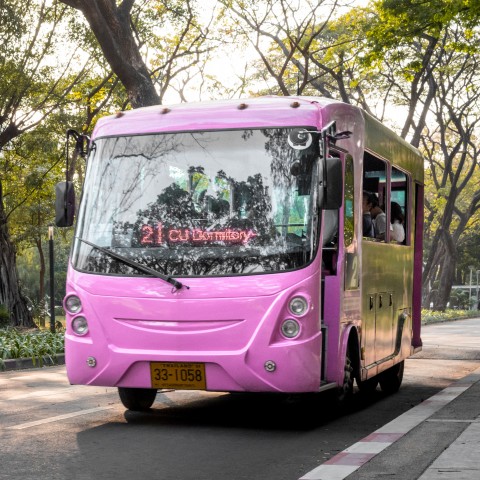
What is your favorite type of transportation?
1. Airplane – 飞机 (fēi jī)
In Chinese: 我仍然记得自己小时候第一次坐飞机有多么兴奋。Pinyin: Wǒ réng rán jì de zì jǐ xiǎo shí hou dì yī cì zuò fēi jī yǒu duō me xīng fèn.
In English: I still remember how excited I was, at a young age, when I was on an airplane for the first time.
2. Train – 火车 (huǒ chē)
In Chinese: 我喜欢坐火车去旅游。Pinyin: Wǒ xǐ huan zuò huǒ chē qù lǚ yóu.
In English: I like to take a train for traveling.
3. Subway – 地铁 (dì tiě)
In Chinese: 我觉得地铁是最方便的交通工具之一。Pinyin: Wǒ jué de dì tiě shì zuì fāng biàn de jiāo tōng gōng jù zhī yī.
In English: I think the subway is one of the most convenient transportation methods.
4. Bus – 公交车 (gōng jiāo chē)
In Chinese: 我之所以会迟到,是因为没有赶上公交车。Pinyin: Wǒ zhī suǒ yǐ huì chí dào, shì yīn wèi méi yǒu gǎn shang gōng jiāo chē.
In English: The reason why I was late is because I missed the bus.
5. Taxi – 出租车 (chū zū chē)
In Chinese: 我很喜欢跟出租车司机聊天。Pinyin: Wǒ hěn xǐ huan gēn chū zū chē sī jī liáo tiān.
In English: I like talking to taxi drivers.
6. Bike – 自行车 (zì xíng chē)
In Chinese: 我非常喜欢骑自行车,因为骑车的时候可以看到街头的景色。Pinyin: Wǒ fēi cháng xǐ huan qí zì xíng chē, yīn wèi qí chē de shí hou kě yǐ kàn dào jiē tóu de jǐng sè.
In English: I enjoy riding a bike because I get to see beautiful scenery on the streets.
7. Airport – 机场 (jī chǎng)
In Chinese: 每天在机场都有很多人依依不舍地分别。Pinyin: Měi tiān zài jī chǎng dōu yǒu hěn duō rén yī yī bù shě de fēn bié.
In English: At the airport, each day there are so many people who are saying goodbyes though they don’t want to.
8. Train Station – 火车站 (huǒ chē zhàn)
In Chinese: 有很多人在火车站过夜。Pinyin: Yǒu hěn duō rén zài huǒ chē zhàn guò yè.
In English: Many people are spending the night at the train station.
9. Bus Stop – 公交车站 (gōng jiāo chē zhàn)
In Chinese: 过了马路你就会看到公交车站。Pinyin: Guò le mǎ lù nǐ jiù huì kàn dao gōng jiāo chē zhàn.
In English: You will see the bus stop once you go across the road.
10. Traffic Light – 红绿灯 (hóng lǜ dēng)
In Chinese: 开车等红绿灯时千万不能看手机。Pinyin: Kāi chē děng hóng lǜ dēng shí qiān wàn bù néng kàn shǒu jī.
In English: Don’t ever look at your phone while waiting for a traffic light in the car.
11. Intersection – 十字路口 (shí zì lù kǒu)
In Chinese: 等你过了十字路口,往右转就可以看见我们了。Pinyin: Děng nǐ guò le shí zì lù kǒu, wǎng yòu zhuǎn jiù kě yǐ kàn jiàn wǒ men le.
In English: After you pass the intersection, just turn right and you will see us immediately.
4. Restaurant
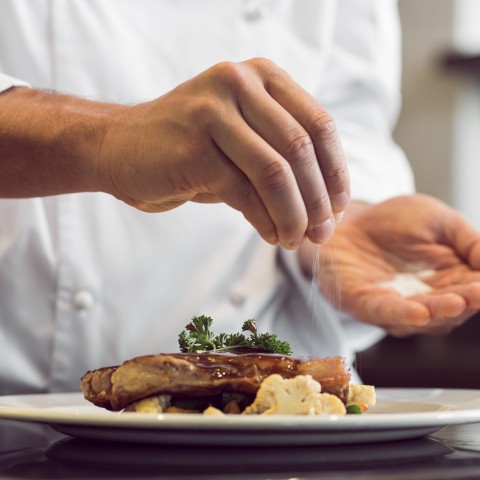
Who doesn’t enjoy eating at a restaurant which serves delicious food?
Now, here are common Chinese nouns food-lovers should be sure to memorize! These words are essential for restaurants in particular.
1. Table – 桌子(zhuō zi)
In Chinese: 我们在五号桌等你。Pinyin: Wǒ men zài wǔ hào zhuō děng nǐ.
In English: We will be waiting for you at table 5.
2. Menu – 菜单 (cài dān)
In Chinese: 请问可以再给我们一份菜单吗?Pinyin: Qǐng wèn kě yǐ zài gěi wǒ men yí fèn cài dān ma?
In English: Can you give us one more menu, please?
3. Waiter – 服务员 (fú wù yuán)
In Chinese: 这个餐厅的服务员很友好。Pinyin: Zhè gè cān tīng de fú wù yuán hěn yǒu hǎo.
In English: The waiters at this restaurant are very friendly.
4. Bill – 账单 (zhàng dān)
In Chinese: 麻烦您给我们一下账单。Pinyin: Má fan nín gěi wǒ men yí xià zhàng dān.
In English: Please give us the bill.
5. Spoon – 勺子 (sháo zi)
In Chinese: 比起筷子,我喜欢用勺子吃米饭。Pinyin: Bǐ qǐ kuài zi, wǒ xǐ huan yòng sháo zi chī mǐ fàn.
In English: I like to eat rice with a spoon instead of chopsticks.
6. Chopsticks – 筷子 (kuài zi)
In Chinese: 很多西方国家的人不会用筷子。Pinyin: Hěn duō xī fāng guó jiā de rén bú huì yòng kuài zi.
In English: Many western people don’t know how to use chopsticks.
7. Plate – 盘子 (pán zi)
In Chinese: 在家里,妈妈负责做饭,我负责洗盘子。Pinyin: Zài jiā li, mā ma fù zé zuò fàn, wǒ fù zé xǐ pán zi.
In English: Mom is in charge of cooking, and I am in charge of washing dishes in the house.
8. Bowl – 碗 (wǎn)
In Chinese: 请给我来一碗面。Pinyin: Qǐng gěi wǒ lái yì wǎn miàn.
In English: Please give me a bowl of noodles.
9. Water – 水 (shuǐ)
In Chinese: 夏天非常干燥,我们更应该多喝水。Pinyin: Xià tiān fēi cháng gàn zào, wǒ men gèng yīng gāi duō hē shuǐ.
In English: Summer is a dry season; we should drink even more water.
10. Tea – 茶 (chá)
In Chinese: 茶是中国很重要的一个文化之一。Pinyin: Chá shì zhōng guó hěn zhòng yào de yí gè wén huà zhī yī.
In English: Tea is one of the most important cultural aspects in China.
11. Vegetables – 蔬菜 (shū cài)
In Chinese: 多吃蔬菜对身体有好处。Pinyin: Duō chī shū cài duì shēn tǐ yǒu hǎo chù.
In English: Eating vegetables is good for your health.
12. Seafood – 海鲜 (hǎi xiān)
In Chinese: 海鲜自助是我的最爱之一。Pinyin: Hǎi xiān zì zhù shì wǒ de zuì ài zhī yī.
In English: The seafood buffet is one of my favorite places.
5. School Essentials

Don’t you miss being a student?
1. College – 大学 (dà xué)
In Chinese: 我很期待大学的生活。Pinyin: Wǒ hěn qī dài dà xué de shēng huó.
In English: I am looking forward to my college life.
2. High School – 高中 (gāo zhōng)
In Chinese: 在过去的高中三年时间里,我们都成长了许多。Pinyin: Zài guò qù de gāo zhōng sān nián shí jiān li, wǒ men dōu chéng zhǎng le xǔ duō.
In English: In the past three years at high school, we all grew up a lot.
3. Middle School – 初中 (chū zhōng)
In Chinese: 我很想念我初中结识的朋友。Pinyin: Wǒ hěn xiǎng niàn wǒ chū zhōng jié shí de péng you.
In English: I miss my friends from middle school very much.
4. Elementary School – 小学 (xiǎo xué)
In Chinese: 小学是我最无忧无虑的日子。Pinyin: Xiǎo xué shì wǒ zuì wú yōu wú lǜ de rì zi.
In English: The days at elementary school were the happiest time ever.
5. Class – 班级 (bān jí)
In Chinese: 我觉得我们班级是最优秀的。Pinyin: Wǒ jué de wǒ men bān jí shì zuì yōu xiù de.
In English: I think my class is the best one of all.
6. Book – 书 (shū)
In Chinese: 请把你的书打开到第90页。Pinyin: Qǐng bǎ nǐ de shū dǎ kāi dào dì jiǔ shí yè.
In English: Please open your book to the 90th page.
7. Teacher – 老师 (lǎo shī)
In Chinese: 我的老师是一位值得敬佩的人。Pinyin: Wǒ de lǎo shī shì yí wèi zhí dé jìng pèi de rén.
In English: My teacher is someone that deserves respect and admiration.
8. Student – 学生 (xué shēng)
In Chinese: 学生时期的我很听父母的话。Pinyin: Xué shēng shí qī de wǒ hěn tīng fù mǔ de huà.
In English: When I was a student, I used to be very obedient to my parents.
9. Classmate – 同班同学 (tóng bān tóng xué)
In Chinese: 我的同班同学们都十分友好。Pinyin: Wǒ de tóng bān tóng xué men dōu shí fēn yǒu hǎo.
In English: All my classmates are very friendly.
10. Major – 专业 (zhuān yè)
In Chinese: 我很开心选择的专业是自己所热爱的。Pinyin: Wǒ hěn kāi xīn xuǎn zé de zhuān yè shì zì jǐ suǒ rè ài de.
In English: I am very happy that the major I chose for myself is something I am passionate about.
11. Exam – 考试 (kǎo shì)
In Chinese: 我觉得自己在这次的考试中发挥得很好。Pinyin: Wǒ jué de zì jǐ zài zhè cì de kǎo shì zhōng fā huī de hěn hǎo.
In English: I think I did very well on this exam.
12. Homework – 作业 (zuò yè)
In Chinese: 很多学生都会拖到快交作业了才开始写。Pinyin: Hěn duō xué shēng dōu huì tuō dào kuài jiāo zuò yè le cái kāi shǐ xiě.
In English: Many students procrastinate until the homework is due.
6. Occupation

1. Doctor – 医生 (yī shēng)
In Chinese: 医生是一个神圣的职业。Pinyin: Yī shēng shì yí gè shén shèng de zhí yè.
In English: Being a doctor is a divine occupation.
2. Lawyer – 律师 (lǜ shī)
In Chinese: 作为一名律师,你需要拥有出色的口才。Pinyin: Zuò wéi yì míng lǜ shī, nǐ xū yào yōng yǒu chū sè de kǒu cái.
In English: As a lawyer, you need to have excellent eloquence.
3. Nurse – 护士 (hù shi)
In Chinese: 昨天给我打针的护士很友善。Pinyin: Zuó tiān gěi wǒ dǎ zhēn de hù shi hěn yǒu shàn.
In English: The nurse who gave me a shot yesterday was very nice.
4. Chef – 厨师 (chú shī)
In Chinese: 一名好厨师会把自己对下厨的全部热情注入到食物中。Pinyin: Yì míng hǎo chú shī huì bǎ zì jǐ duì xià chú de quán bù rè qíng zhù rù dào shí wù zhōng.
In English: An excellent chef will devote all his passion into the food he cooks.
5. Police – 警察 (jǐng chá)
In Chinese: 想成为一名警察,一定要敢于奉献。Pinyin: Xiǎng chéng wéi yì míng jǐng chá, yí dìng yào gǎn yú fèng xiàn.
In English: You have to be brave enough to dedicate your life in order to become a police officer.
7. Family Members

1. Family – 家庭 (jiā tíng)
In Chinese: 家庭是无法被取代的。Pinyin: Jiā tíng shì wú fǎ bèi qǔ dài de.
In English: Nothing can replace a family.
2. Mom / Dad – 妈妈 / 爸爸 (mā ma / bà ba)
In Chinese: 妈妈 / 爸爸很宠爱弟弟。Pinyin: Mā ma / Bà ba hěn chǒng ài dì di.
In English: Mom / Dad spoils my younger brother a lot.
3. Parents – 父母 (fù mǔ)
In Chinese: 我和父母就像朋友一般亲近。Pinyin: Wǒ hé fù mǔ jiù xiàng péng you yì bān qīn jìn.
In English: My parents and I are as close as friends.
4. Husband / Wife – 丈夫 / 妻子 (zhàng fu / qī zǐ)
In Chinese: 她/他与自己的丈夫/妻子十分恩爱。Pinyin: Tā / Tā yǔ zì jǐ de zhàng fu / qī zǐ shí fēn ēn ài.
In English: She / He is very loving with her / his husband / wife.
5. Daughter / Son – 女儿 / 儿子 (nǚ ér / ér zi)
In Chinese: 即使离得很远,他的女儿 / 儿子还是会经常去看他。Pinyin: Jí shǐ lí de hěn yuǎn, tā de nǚ ér / ér zi hái shì huì jīng cháng qù kàn tā.
In English: His daughter / son visits him a lot even though they are far away from each other.
6. Grandmother / Grandfather (from Dad’s side) – 奶奶 / 爷爷 (yé ye / nǎi nai)
In Chinese: 我最后悔的事情就是奶奶 / 爷爷去世的时候我没来得及去送行。Pinyin: Wǒ zuì hòu huǐ de shì qing jiù shì nǎi nai / yé ye qù shì de shí hou wǒ méi lái de jí qù sòng xíng.
In English: The thing that I regret the most was not being able to be with my grandmother / grandfather when she / he was gone.
7. Grandmother / Grandfather (from Mom’s side) – 姥姥 / 姥爷 (lǎo lao / lǎo ye)
In Chinese: 姥姥 / 姥爷经常给我做好吃的。Pinyin: Lǎo lao / Lǎo ye jīng cháng gěi wǒ zuò hǎo chī de.
In English: My grandmother / grandfather always cooks delicious food for me.
8. Body Parts

1. Body – 身体 (shēn tǐ)
In Chinese: 因为昨天爬了一整天的山,导致我现在身体酸疼。
Pinyin: Yīn wèi zuó tiān pá le yì zhěng tiān de shān, dǎo zhì wǒ xiàn zài shēn tǐ suān téng.
In English: Since I was hiking all day yesterday, my body is now feeling sore all over the place.
2. Head – 头 (tóu)
In Chinese: 我刚才一不小心磕到了头。
Pinyin: Wǒ gāng cái yí bù xiǎo xīn kē dào le tóu.
In English: I hit my head by accident just now.
3. Arm – 胳膊 (gē bo)
In Chinese: 爸爸的胳膊力气很大,我记得小时候经常被他举起来。
Pinyin: Bà ba de gē bo lì qi hěn dà, wǒ jì de xiǎo shí hòu jīng cháng bèi tā jǔ qǐ lái.
In English: My dad’s arms are very strong; I remember I used to be lifted up by him when I was little.
4. Leg – 腿 (tuǐ)
In Chinese: 那位舞蹈演员的腿可真柔韧。
Pinyin: Nà wèi wǔ dǎo yǎn yuán de tuǐ kě zhēn róu rèn.
In English: That dancer’s legs are really flexible.
5. Eye – 眼睛 (yǎn jīng)
In Chinese: 虽然她的眼睛是盲的,但是她心灵的眼睛一直是明亮的。
Pinyin: Suī rán tā de yǎn jīng shì máng de, dàn shì tā xīn líng de yǎn jīng yì zhí shì míng liàng de.
In English: Her eyes are blind, but the eyes of her heart will always stay bright.
6. Nose – 鼻子 (bí zi)
In Chinese: 狗的鼻子嗅觉十分灵敏。
Pinyin: Gǒu de bí zi xiù jué shí fēn líng mǐn.
In English: A dog’s nose possesses strong olfaction.
7. Mouth – 嘴 (zuǐ)
In Chinese: 弟弟经常在吃饭的时候用嘴吸溜面条。
Pinyin: Dì di jīng cháng zài chī fàn de shí hou yòng zuǐ xī liu miàn tiáo.
In English: My younger brother always slurps noodles with his mouth while eating.
8. Face – 脸 (liǎn)
In Chinese: 你的脸上有东西。
Pinyin: Nǐ de liǎn shang yǒu dōng xi.
In English: There is something on your face.
9. Hand – 手 (shǒu)
In Chinese: 初次见面时握手是一种礼貌的行为。
Pinyin: Chū cì jiàn miàn shí wò shǒu shì yì zhǒng lǐ mào de xíng wéi.
In English: Shaking hands the first time you meet someone is a polite gesture.
10. Foot – 脚 (jiǎo)
In Chinese: 昨天在跑步时,我一不小心扭伤了脚。
Pinyin: Zuó tiān zài pǎo bù shí, wǒ yí bù xiǎo xīn niǔ shāng le jiǎo.
In English: When I was running yesterday, I injured my foot by accident.
9. Time
Here are the most important Chinese time nouns for you to study! Knowing these words will greatly benefit you in day-to-day life.
1. Today – 今天 (jīn tiān)
2. Tomorrow – 明天 (míng tiān)
3. The Day Before Yesterday – 前天 (qián tiān)
4. The Day After Tomorrow – 后天 (hòu tiān)
In Chinese: 今天 / 明天 / 前天 / 后天是我最好的朋友的生日。
Pinyin: Jīn tiān / míng tiān / qián tiān / hòu tiān shì wǒ zuì hǎo de péng you de shēng rì.
In English: Today / Tomorrow / The day before yesterday / The day after tomorrow is my best friend’s birthday.
5. Week – 周 (zhōu)
Monday – 周 (zhōu yī)
Tuesday – 周二 (zhōu èr)
Wednesday – 周三 (zhōu sān)
Thursday – 周四 (zhōu sì)
Friday – 周五 (zhōu wǔ)
Saturday – 周六 (zhōu liù)
Sunday – 周日 (zhōu rì)
In Chinese: 周六是我一周中最喜欢的日子。
Pinyin: Zhōu liù shì wǒ yì zhōu zhōng zuì xǐ huān de rì zi.
In English: Saturday is my favorite day of the week.
6. Day – 天 (tiān)
In Chinese: 再过十天就是我的生日了,这让我感到非常激动。
Pinyin: Zài guò shí tiān jiù shì wǒ de shēng rì le, zhè ràng wǒ gǎn dào fēi cháng jī dòng.
In English: My birthday is in ten days and this makes me very excited.
7. Month – 月 (yuè)
In Chinese: 每年的二月份是中国的春节。
Pinyin: Měi nián de èr yuè fèn shì zhōng guó de chūn jié.
In English: Every year in February is the Chinese New Year.
8. Year – 年 (nián)
In Chinese: 不管多少年过去,我们的友谊还是没有变。
Pinyin: Bù guǎn duō shǎo nián guò qu, wǒ men de yǒu yì hái shì méi yǒu biàn.
In English: No matter how many years have passed by, there is not a single thing that’s changed in our friendship.
9. Time – 时间 (shí jiān)
In Chinese: 时间就是金钱。
Pinyin: Shí jiān jiù shì jīn qián.
In English: Time is money.
10. Hour – 小时 (xiǎo shí)
In Chinese: 他每次至少迟到一个小时。
Pinyin: Tā měi cì zhì shǎo chí dào yí gè xiǎo shí.
In English: He is always at least an hour late every time.
11. Minute – 分钟 (fēn zhōng)
In Chinese: 我还有五分钟就到。
Pinyin: Wǒ hái yǒu wǔ fēn zhōng jiù dào.
In English: I will be there in five minutes.
10. Animals


1. Body – 身体 (shēn tǐ)
In Chinese: 因为昨天爬了一整天的山,导致我现在身体酸疼。Pinyin: Yīn wèi zuó tiān pá le yì zhěng tiān de shān, dǎo zhì wǒ xiàn zài shēn tǐ suān téng.
In English: Since I was hiking all day yesterday, my body is now feeling sore all over the place.
2. Head – 头 (tóu)
In Chinese: 我刚才一不小心磕到了头。Pinyin: Wǒ gāng cái yí bù xiǎo xīn kē dào le tóu.
In English: I hit my head by accident just now.
3. Arm – 胳膊 (gē bo)
In Chinese: 爸爸的胳膊力气很大,我记得小时候经常被他举起来。Pinyin: Bà ba de gē bo lì qi hěn dà, wǒ jì de xiǎo shí hòu jīng cháng bèi tā jǔ qǐ lái.
In English: My dad’s arms are very strong; I remember I used to be lifted up by him when I was little.
4. Leg – 腿 (tuǐ)
In Chinese: 那位舞蹈演员的腿可真柔韧。Pinyin: Nà wèi wǔ dǎo yǎn yuán de tuǐ kě zhēn róu rèn.
In English: That dancer’s legs are really flexible.
5. Eye – 眼睛 (yǎn jīng)
In Chinese: 虽然她的眼睛是盲的,但是她心灵的眼睛一直是明亮的。Pinyin: Suī rán tā de yǎn jīng shì máng de, dàn shì tā xīn líng de yǎn jīng yì zhí shì míng liàng de.
In English: Her eyes are blind, but the eyes of her heart will always stay bright.
6. Nose – 鼻子 (bí zi)
In Chinese: 狗的鼻子嗅觉十分灵敏。Pinyin: Gǒu de bí zi xiù jué shí fēn líng mǐn.
In English: A dog’s nose possesses strong olfaction.
7. Mouth – 嘴 (zuǐ)
In Chinese: 弟弟经常在吃饭的时候用嘴吸溜面条。Pinyin: Dì di jīng cháng zài chī fàn de shí hou yòng zuǐ xī liu miàn tiáo.
In English: My younger brother always slurps noodles with his mouth while eating.
8. Face – 脸 (liǎn)
In Chinese: 你的脸上有东西。Pinyin: Nǐ de liǎn shang yǒu dōng xi.
In English: There is something on your face.
9. Hand – 手 (shǒu)
In Chinese: 初次见面时握手是一种礼貌的行为。Pinyin: Chū cì jiàn miàn shí wò shǒu shì yì zhǒng lǐ mào de xíng wéi.
In English: Shaking hands the first time you meet someone is a polite gesture.
10. Foot – 脚 (jiǎo)
In Chinese: 昨天在跑步时,我一不小心扭伤了脚。Pinyin: Zuó tiān zài pǎo bù shí, wǒ yí bù xiǎo xīn niǔ shāng le jiǎo.
In English: When I was running yesterday, I injured my foot by accident.
9. Time
Here are the most important Chinese time nouns for you to study! Knowing these words will greatly benefit you in day-to-day life.
1. Today – 今天 (jīn tiān)
2. Tomorrow – 明天 (míng tiān)
3. The Day Before Yesterday – 前天 (qián tiān)
4. The Day After Tomorrow – 后天 (hòu tiān)
In Chinese: 今天 / 明天 / 前天 / 后天是我最好的朋友的生日。Pinyin: Jīn tiān / míng tiān / qián tiān / hòu tiān shì wǒ zuì hǎo de péng you de shēng rì.
In English: Today / Tomorrow / The day before yesterday / The day after tomorrow is my best friend’s birthday.
5. Week – 周 (zhōu)
Monday – 周 (zhōu yī)
Tuesday – 周二 (zhōu èr)
Wednesday – 周三 (zhōu sān)
Thursday – 周四 (zhōu sì)
Friday – 周五 (zhōu wǔ)
Saturday – 周六 (zhōu liù)
Sunday – 周日 (zhōu rì)
In Chinese: 周六是我一周中最喜欢的日子。
Pinyin: Zhōu liù shì wǒ yì zhōu zhōng zuì xǐ huān de rì zi.
In English: Saturday is my favorite day of the week.
6. Day – 天 (tiān)
In Chinese: 再过十天就是我的生日了,这让我感到非常激动。Pinyin: Zài guò shí tiān jiù shì wǒ de shēng rì le, zhè ràng wǒ gǎn dào fēi cháng jī dòng.
In English: My birthday is in ten days and this makes me very excited.
7. Month – 月 (yuè)
In Chinese: 每年的二月份是中国的春节。Pinyin: Měi nián de èr yuè fèn shì zhōng guó de chūn jié.
In English: Every year in February is the Chinese New Year.
8. Year – 年 (nián)
In Chinese: 不管多少年过去,我们的友谊还是没有变。Pinyin: Bù guǎn duō shǎo nián guò qu, wǒ men de yǒu yì hái shì méi yǒu biàn.
In English: No matter how many years have passed by, there is not a single thing that’s changed in our friendship.
9. Time – 时间 (shí jiān)
In Chinese: 时间就是金钱。Pinyin: Shí jiān jiù shì jīn qián.
In English: Time is money.
10. Hour – 小时 (xiǎo shí)
In Chinese: 他每次至少迟到一个小时。Pinyin: Tā měi cì zhì shǎo chí dào yí gè xiǎo shí.
In English: He is always at least an hour late every time.
11. Minute – 分钟 (fēn zhōng)
In Chinese: 我还有五分钟就到。Pinyin: Wǒ hái yǒu wǔ fēn zhōng jiù dào.
In English: I will be there in five minutes.
10. Animals

Are you an animal lover?
1. Cat – 猫 (māo)
In Chinese: 猫是一种十分敏捷的动物。Pinyin: Māo shì yì zhǒng shí fēn mǐn jié de dòng wù.
In English: Cats are very agile animals.
2. Dog – 狗 (gǒu)
In Chinese: 狗是人类最忠实的朋友。Pinyin: Gǒu shì rén lèi zuì zhōng shí de péng you.
In English: Dogs are the most loyal friend for humans.
3. Bird – 鸟 (niǎo)
In Chinese: 我喜欢清晨的鸟叫声。Pinyin: Wǒ xǐ huan qīng chén de niǎo jiào shēng.
In English: I enjoy birds’ singing in the morning.
4. Squirrel – 松鼠 (sōng shǔ)
In Chinese: 小松鼠吃东西的样子很可爱。Pinyin: Xiǎo sōng shǔ chī dōng xi de yàng zi hěn kě ài.
In English: The way squirrels eat food is so adorable.
5. Snake – 蛇 (shé)
In Chinese: 蛇是一种冷血动物。Pinyin: Shé shì yì zhǒng lěng xuè dòng wù.
In English: Snakes are cold-blooded animals.
6. Horse – 马 (mǎ)
In Chinese: 马是人类最原始的交通工具之一。Pinyin: Mǎ shì rén lèi zuì yuán shǐ de jiāo tōng gōng jù zhī yī.
In English: Horses are one of the most primary transportation methods for humans.
7. Deer – 鹿 (lù)
In Chinese: 我从没有在森林中见到过鹿。Pinyin: Wǒ cóng méi yǒu zài sēn lín zhōng jiàn dao guo lù.
In English: I’ve never seen a deer in the woods.
8. Fish – 鱼 (yú)
In Chinese: 鱼儿们自由自在地在水中嬉戏着。Pinyin: Yú er men zì yóu zì zài de zài shuǐ zhōng xī xì zhe.
In English: Fish are swimming freely and playfully in the water.
9. Pig – 猪 (zhū)
In Chinese: 猪看起来很笨,实际上很聪明。Pinyin: Zhū kàn qǐ lái hěn bèn, shí jì shang hěn cōng míng.
In English: Although pigs seem to be dumb, they are actually very smart.
10. Cow – 牛 (niú)
In Chinese: 牛的力气很大。Pinyin: Niú de lì qì hěn dà.
In English: Cows have great strength.
11. Conclusion
Remember that “noun” in Chinese is 名词 (míng cí), and we’re sure that after this long journey of studying these Chinese nouns lists, your brain must have absorbed some of the common Chinese nouns. Even if you haven’t memorized all 100+ Chinese nouns, know that you’ve taken a great step toward getting there, and practice is your best friend!
Of course, there’s a lot more to talk about when it comes to nouns in the Chinese language; these treasures are all waiting for you at ChineseClass101.com. Whether you’re looking for nouns in Chinese grammar structures or nouns in the Chinese language in general, we have everything ready for you there! Click on the link to collect your treasure right now!
And before you go, let us know in the comments what new nouns in Chinese you learned! Are there any Chinese nouns you still want to know? We look forward to hearing from you!

Learn the 20+ Most Useful Compliments in Chinese
Most people like hearing compliments, and they allow you to express your liking for someone and provide an opportunity for people to open up to each other. When they’re heard in a sincere manner, people feel appreciated. With that being said, when you have the opportunity to compliment someone, do it. It’s the key to their heart!
There are many kinds of compliments in Chinese, and they need to be used in different situations. In addition, there’s a wide spectrum of tones and ways to say them. Don’t worry, though; they’re not difficult at all. As long as you follow our guide, you can become a master of giving Chinese compliments!

Table of Contents
- Complimenting Someone’s Look
- Complimenting Someone’s Work
- Complimenting Someone’s Skills
- Other Compliments
- How to Make Your Compliments Sound More Sincere
- What to Expect After Giving Compliments
- Conclusion
1. Complimenting Someone’s Look
1-
Example situation: Suppose your friend is dressing up today for a party, and you think they look very nice.
In Chinese: 你今天穿得怎么这么好看。
Pinyin: Nǐ jīn tiān chuān de zěn me zhè me hǎo kàn.
In English: “Your outfit looks great today.”
2-
Example situation: Suppose your friend did her makeup perfectly today.
In Chinese: 你今天的妆容好精致啊。
Pinyin: Nǐ jīn tiān de zhuāng róng hǎo jīng zhì a.
In English: “Your makeup looks great today.”
3-
Example situation: Suppose a guy is admiring the girl he likes and thinks she looks pretty while smiling.
In Chinese: 你笑起来可真美。
Pinyin: Nǐ xiào qǐ lái kě zhēn měi.
In English: “You are so pretty when you are smiling.”
4-
Example situation: Suppose your friend is wearing a suit today for a presentation, and he looks very nice in the suit.
In Chinese: 你这身西装穿起来非常绅士。
Pinyin: Nǐ zhè shēn xī zhuāng chuān qǐ lái fēi cháng shēn shì.
In English: “Your suit makes you look like such a gentleman.”
Compliment your dream girl with the best you’ve got!
5-
Example situation: Suppose your relative just had her baby, and you want to say something nice about the baby. You happen to notice that her eyes are pretty.
In Chinese: 瞧这双大眼睛,多么炯炯有神啊。
Pinyin: Qiáo zhè shuāng dà yǎn jīng, duō me jiǒng jiǒng yǒu shén a.
In English: “Look at these big eyes, how bright and full of life.”
6-
Example situation: Suppose your friend is going to have a football game, and you see that he looks very confident and ready for it.
In Chinese: 你今天可真是神采飞扬。
Pinyin: Nǐ jīn tiān kě zhēn shì shén cǎi fēi yáng.
In English: “Today you seem so full of spirit.”
2. Complimenting Someone’s Work
7-
Example situation: Suppose your teammate in a basketball match just scored for your team.
In Chinese: 干得漂亮。
Pinyin: Gàn de piào liang.
In English: “Good job.”
8-
Example situation: Suppose you did something good for your company and your boss wants to compliment you in front of other people so that they will learn from you.
In Chinese: 你是大家的楷模。
Pinyin: Nǐ shì dà jiā de kǎi mó.
In English: “You are everyone’s role model.”
When we have done something with genuine effort, we deserve to be appreciated.
9-
Example situation: Suppose your classmate offered a very creative and smart idea for a group project.
In Chinese: 你可真是个有想法的人。
Pinyin: Nǐ kě zhēn shì gè yǒu xiǎng fǎ de rén.
In English: “You have some good ideas.”
10-
Example situation: Suppose your friends were confused about what to do, and you offered a great idea that everyone liked.
In Chinese: 你简直就是我们的智多星。
Pinyin: Nǐ jiǎn zhí jiù shì wǒ men de zhì duō xīng.
In English: “You deserve to be called the most resourceful person among us.”
11-
Example situation: Suppose your friend taught you how to make a dish that seemed pretty hard for you.
In Chinese: 你这也太厉害了吧。
Pinyin: Nǐ zhè yě tài lì hai le ba.
In English: “I can’t believe you are so great at this.”
3. Complimenting Someone’s Skills
12-
Example situation: Suppose you’re asking your friend what to wear for a date and she gives you a good idea of what to wear.
In Chinese: 你的品味也太好了。
Pinyin: Nǐ de pǐn wèi yě tài hǎo le.
In English: “Your taste is so good.”
13-
Example situation: Suppose your friend invited you over to his house and cooked something delicious for you.
In Chinese: 你做饭好棒啊。
Pinyin: Nǐ zuò fàn hǎo bàng a.
In English: “You are a fantastic cook.”
14-
Example situation: Suppose you’re unsure about your future, and your friend showed great wisdom and helped you understand what you should pursue.
In Chinese: 你太有智慧了。
Pinyin: Nǐ tài yǒu zhì huì le.
In English: “You are such a wise person.”
15-
Example situation: Suppose you just saw your friend’s new photo shots on social media; you think they look great and want to say something nice.
In Chinese: 你照相技术好牛啊。
Pinyin: Nǐ zhào xiàng jì shù hǎo niú a.
In English: “Your photography skill is amazing.”
How are your photography skills?
16-
Example situation: Suppose you just asked your friend for life advice, and what he told you was very helpful.
In Chinese: 你有着成熟的思想。
Pinyin: Nǐ yǒu zhe chéng shú de sī xiǎng.
In English: “You have an extremely mature mind.”
17-
Example situation: Suppose you asked your friend about philosophy, and he discussed something deep.
In Chinese: 你的见解很有深度。
Pinyin: Nǐ de jiàn jiě hěn yǒu shēn dù.
In English: “Your ideas are very insightful.”
18-
Example situation: Suppose your friend just told a very funny joke.
In Chinese: 你可真是富有幽默感啊。
Pinyin: Nǐ kě zhēn shì fù yǒu yōu mò gǎn a.
In English: “You are so full of a sense of humor.”
4. Other Compliments
19-
Example situation: Suppose your friend showed great talent for singing and you enjoy people who sing well.
In Chinese: 你简直就是我的偶像。
Pinyin: Nǐ jiǎn zhí jiù shì wǒ de ǒu xiàng.
In English: “You are like an idol to me.”
20-
Example situation: Suppose your friend received a high test score without even studying, but you received a lower score after studying so much.
In Chinese: 我可真是羡慕死你了。
Pinyin: Wǒ kě zhēn shì xiàn mù sǐ nǐ le.
In English: “I envy you so much that I could die for it.”
We should all strive to become a better person.
21-
Example situation: Suppose your friend is a very hardworking person, which motivates you to work hard.
In Chinese: 是你让我想成为一个更好的人。
Pinyin: Shì nǐ ràng wǒ xiǎng chéng wéi yī gè gèng hǎo de rén.
In English: “You make me a better person.”
22-
Example situation: Suppose your friend just helped you with a difficult math problem that you couldn’t solve, so you want to show your admiration.
In Chinese: 你可真让我自叹不如啊。
Pinyin: Nǐ kě zhēn ràng wǒ zì tàn bù rú a.
In English: “You are so good that it makes me feel like I am so far from your excellence.”
5. How to Make Your Compliments Sound More Sincere
Sometimes, compliments can sound pretentious if they’re not given properly, which can make the effect backfire. We want to express our compliments in a sincere manner to make the other person feel comfortable accepting the compliment. This is a great way to enhance a relationship.
The compliments in Chinese that we listed here are all in a sincere tone. If you notice, we sometimes add particles such as 啊 (a) and 呀 (ya) to emphasize the tone and make it sound more friendly. Moreover, you can add more personal details to specify why you want to offer the compliment while avoiding vague Chinese compliments such as 挺好 (tǐng hǎo) or 不错 (bú cuò), meaning “It’s good” or “Not bad.” Phrases like these don’t provide enough depth to the compliment.
6. What to Expect After Giving Compliments
Unlike in Western culture, where you’ll probably prefer to directly accept the compliment and say “Thank you,” the Chinese response to compliments is different. Chinese people like to shy away from compliments and appear to be modest. Traditionally, accepting a compliment without being self-deprecating would be impolite. But now, more and more people are learning to reply to compliments with a “Thank you.”
If you ever receive a compliment in Chinese, don’t panic! Here, we’ve prepared a list of phrases you can use to respond to compliments in an appropriate manner.
1-
Example situation: Suppose you’re receiving a compliment from your friend, and your friend’s skill on the matter is not bad, so you compliment your friend back by saying that the two of you are on the same level.
In Chinese: 彼此彼此。
Pinyin: Bǐ cǐ bǐ cǐ.
In English: “You are just the same as I am.”
2-
Example situation: Suppose you just showed that you have good skills in something, and you want to seem modest. You can say that your skill is poor.
In Chinese: 献丑了。
Pinyin: Xiàn chǒu le.
In English: “Sorry to show my poor skills.”
3-
Example situation: Suppose you’re receiving compliments from your friend, but you want to seem modest.
In Chinese: 哪有。
Pinyin: Nǎ yǒu
In English: “Not at all.”
4-
Example situation: Suppose you’re receiving compliments from your friend, but you want to seem modest.
In Chinese: 我还差得远呢。
Pinyin: Wǒ hái chà dé yuǎn ne
In English: “I’m still far from that.”
7. Conclusion
Want to win a girl’s heart with a good compliment? Do you feel awkward when you receive a compliment in Chinese? Now you’ve found all the answers in this article. As long as you keep practicing, you’ll definitely be able to produce a healthy social life, knowing when and how to say the right compliments.
Of course, a diligent Chinese language learner like you probably won’t feel content with only this article. We have more for you at ChineseClass101.com, where we deliver free, high-quality Chinese lessons to you every week, allowing you to enjoy an immersive and interesting learning experience with professional teachers! Why not give it a try right now?

儿童节: Celebrating International Children’s Day in China
Do you remember being a kid? Growing up, I always looked forward to a day off from school (and dreaded most days not off school…).
Well, Children’s Day in China is a day off from school that children can look forward to all year long; it’s a holiday filled with fun and excitement for the little ones! In this article, you’ll explore how children and parents celebrate International Children’s Day, pick up some vocab, and learn the Chinese phrase for someone who’s still a child at heart.
Let’s get started.

1. What is Children’s Day?
International Children’s Day, celebrated in many countries around the world, is a holiday dedicated to honoring and protecting children; it’s also a day for the little ones to have fun and 逃学 (táoxué), or “be off school.”
Let’s briefly look at some Children’s Day history. The holiday is thought to have started as early as 1857, when a pastor living in Massachusetts gave a special sermon for and about children. It wasn’t until 1920, however, that Children’s Day was officially declared a holiday; Turkey was the first country to make this declaration, and Mustafa Kemal Atatürk made it official in 1929. In 1950, the holiday spread rapidly to a number of other countries.
Children’s Day, as we know it today, started as a means of promoting children’s rights and protesting the killing and harming of children. The United Nations declared this holiday a way to mourn the loss of all the children who died as a result of poisoning from the Nazis during WWII.
Chinese Children’s Day started in 1932, initiated by the Shanghai China Salesian Society.
-
→ Learn the most important facts about Chinese Society with us, and be prepared for your visit or further studies!
2. When is Children’s Day in China?
Each year, International Children’s Day is celebrated on June 1. This is when the majority of countries celebrate this holiday, though many countries have their own Children’s Day celebrations on other dates. For example, the United Nations celebrates World Children Day on November 20.
3. Chinese Children’s Day Celebrations
Today, Children’s Day in China is a time for children to feel 欢乐 (huānlè), or “happy,” and loved. Most children get the day off school, though schools do put on fun performances or take children on field trips, where they can see a movie or engage in other exciting activities. Only children under the age of fourteen partake in Children’s Day activities.
Some of the most popular Children’s Day traditions in China include taking one’s child to the 公园 (gōngyuán), or “park,” making their favorite snack or dinner, and giving them a 礼物 (lǐwù), or “gift.” Some common gifts include candy, balloons, and toys.
The most important thing, though, is the opportunity for parents to show their children how much they love and care about them. Being loved really is the best feeling, isn’t it?
-
→ Study our vocabulary lists on the Must-Know Terms for Family Members and the Must-Know Words & Phrases to Use at an Amusement Park.
4. The Children at Heart
Did you know there’s a Chinese phrase for adults who are really children at heart? It’s 童心未泯 (tóngxīn wèi mǐn), which means “to be a child at heart.”
It’s no question that life in today’s world is hectic, crazy, and even full of sorrow at times. Children and adults alike are experiencing lots of stress and anxiety on a day-to-day basis. This makes the significance of being able to maintain a childlike outlook really shine through!
So next time you want to indulge in a favorite childhood dessert, run around outside in the grass, or act silly with your bestie, why not go for it? 😉
Do you consider yourself a child at heart? Or maybe an old soul? Both?
-
→ China has another holiday dedicated to the country’s youth. Learn all about Youth Day and the May Fourth Movement with us!
5. Essential Vocabulary for Children’s Day
Ready to review some of the vocabulary words from this article? Here are the essential words and phrases to remember for Children’s Day in China!
- 零食 (língshí) — “snack”
- 公园 (gōngyuán) — “park”
- 糖果 (tángguǒ) — “candy”
- 礼物 (lǐwù) — “gift”
- 儿童 (értóng) — “children”
- 气球 (qìqiú) — “balloon”
- 家长 (jiāzhǎng) — “parent”
- 天真 (tiānzhēn) — “innocent”
- 逃学 (táoxué) — “be off school”
- 欢乐 (huānlè) — “happy”
If you want to hear the pronunciation of each word and phrase listed above, visit our Chinese vocabulary list for Children’s Day.
Final Thoughts
We hope you enjoyed learning about Children’s Day in China with us, and that you took away some valuable information on Chinese culture.
Do you celebrate Children’s Day in your country? If you have kids, what activities do you do together on this holiday? Let us know in the comments!
If you’re itching to continue learning about Chinese culture and the language, check out the following articles on ChineseClass101.com:
- The Hungry Ghost Festival in Chinese Culture
- Celebrating the Chinese Mid-Autumn Festival
- How to Celebrate Single’s Day in China: You’re Not Alone!
- How to Introduce Your Family in Chinese
- Learn Chinese from Great Shows & Chinese Movies on Netflix
This only scratches the surface of all that ChineseClass101.com can offer the aspiring Chinese-learner. To make the most of your study time, create your free lifetime account today; for access to exclusive content and lessons, upgrade to our Premium or Premium PLUS plans!
Good luck, stay safe, and Happy Children’s Day!

The Anger Game: Phrases for Getting Angry in Chinese
Question: If ordering food, asking for directions, and exchanging contact information are only beginner-level language skills, what makes an advanced-level Chinese learner?
Here’s my answer: Using the perfect Chinese phrases to express your anger. If you’ve experienced the frustration of not being able to defend yourself in a heated conversation because of your limited vocabulary, you know what I’m talking about.
In this article, you’ll find over thirty phrases and expressions to use in intense situations. These will help you understand what that angry Chinese man might be yelling about, as well as expand your vocabulary to help you express your own feelings and emotions more freely.
Before we proceed, I’d like to assure you that there are no overly vulgar or profane angry Chinese phrases below. That said, you should still be cautious when using any of these phrases—while they’re not too strong, they can still be offensive or rude, especially if used in the wrong context. If you’re curious about curse words in Chinese, you can read all about them in a separate lesson.

Table of Contents
- Angry Imperatives
- Angry Warnings
- Angry Blames
- Describe Your Feelings
- Ways to Calm Down When You’re Angry
- Final Round: Apologizing
- Conclusion
1: Angry Imperatives
When annoyed, we tend to give impatient and harsh imperatives. For example, in English, we say things like “Shut up,” “Cut it out,” or “Get out of here.”
In Chinese, some of these phrases have translations with the exact same meanings, while others vary a bit.
走开! (Zǒukāi!)
This phrase literally means “Walk away,” but it’s really a stronger phrase to tell someone: “Get out of the way!”
滚蛋! (Gǔndàn!)
The literal translation of this phrase sounds a little too cute (or yummy): “to roll an egg.”
滚 (gǔn), meaning “to roll,” here is asking someone to “get lost.” The word 蛋 (dàn), or “egg,” in Chinese slang is often associated with something indecent, such as 王八蛋 (wángbādàn), the equivalent of “bastard,” and 妈蛋 (mā dàn), the equivalent of “crap.”
滚 and 蛋 together is a common phrase that translates as “Get the heck out of here!”
闭嘴! (Bìzuǐ!)
Just like its literal translation, this phrase means “Shut your mouth!”
To make this command, or any of the others, stronger and angrier, stick the phrase 你给我 (nǐ gěi wǒ) before the verb.
你给我 (nǐ gěi wǒ) literally means “you give me,” but in imperatives, it’s short for “I’m ordering you to do …” This is a tone intensifier that presumably makes the speaker feel more powerful.
你给我闭嘴!(Nǐ gěi wǒ bìzuǐ!)
闭嘴 (bìzuǐ), as we mentioned earlier, means “Shut your mouth.” Adding 你给我 (nǐ gěi wǒ) doesn’t change the meaning. Instead, it only makes the tone stronger.
你给我滚蛋!(Nǐ gěi wǒ gǔndàn!)
As explained earlier, 滚蛋 (gǔndàn) means “Get the heck out of here!” 你给我 (nǐ gěi wǒ) only makes 滚蛋 more potent, similar to the English “Get the hell outta here!”
The subject 你 (nǐ), meaning “you,” can be omitted.
给我滚蛋! (Gěi wǒ gǔndàn!) has the same meaning and effect.
你给我听好!(Nǐ gěi wǒ tīng hǎo!)
This literally translates to “You give me listen well!” But it means something more like: “You better listen to me carefully!”
To sternly order someone not to do something, like a parent would tell a child not to interrupt, we can use the 不许 (bùxǔ) + verb pattern.
不许 (bùxǔ) means “not allowed.” Here are some examples using the 不许 before verbs:
不许插嘴。(Bùxǔ chāzuǐ.)
This literally means “Interrupting is not allowed.” It translates as “No interrupting.”
不许胡说。(Bùxǔ húshuō.)
胡说 (húshuō) means “to talk nonsense.” 不许胡说 is telling someone to stop making stuff up.
不许说脏话。(Bùxǔ shuō zānghuà.)
This phrase is typically used by a parent telling his or her child not to say bad words.
脏话 (zānghuà) means “dirty words” or “bad words.”
2: Angry Warnings
When the angry imperatives don’t work, it might be time to upgrade to some intimidating warnings. These warning phrases are a great way to show someone you’re about to get very angry in Chinese.
别惹我。(Bié rě wǒ.)
The verb 惹 (rě) means “to provoke,” but here it means “to mess with” or “to irritate.”
别惹我 is used to warn someone: “Don’t mess with me.”
你给我小心点。(Nǐ gěi wǒ xiǎoxīn diǎn.)
You just learned that 你给我 (nǐ gěi wǒ) intensifies an imperative. It also intensifies a warning.
小心点 (xiǎoxīn diǎn) literally means “to be a little careful.” Together, the phrase 你给我小心点 translates to “You better watch out.”
我警告你,这是最后一次。 (Wǒ jǐnggào nǐ, zhè shì zuìhòu yí cì.)
This is a firm warning that says: “I’m warning you, this is the last time.”
我的忍耐已经达到极限了。(Wǒ de rěnnài yǐjīng dádào jíxiàn le.)
This one means: “My tolerance has reached its limit.”
别怪我不客气。(Bié guài wǒ bú kèqi.)
The phrase 不客气 (bú kèqi) here has a different meaning than the 不客气 that’s used to say “You’re welcome.”
客气 (kèqi) is a unique and almost untranslatable word in Chinese. It has the positive meaning of being courteous, nice, and formal. Its negative form, 不客气 (bú kèqi), means “not nice” or “without any courtesy or etiquette.”
别怪我 means “Don’t blame me.” Together, the phrase 别怪我不客气 means something like “Don’t blame me for being mean.”
This is a common phrase used in trash talk.
3: Angry Blames
When it’s time to really get angry in Chinese, angry blames take the stage. During the exchange of angry words and phrases, putting blame on the other person and name-calling always bring tension to the next level. We’ll introduce these phrases, but hope you never have to use them.
The common blaming and name-calling phrases in Chinese we’ve listed below are in order from least harsh to most harsh.
你太过分了。(Nǐ tài guòfèn le.)
This phrase means: “You crossed the line.”
你这个人真是莫名其妙。(Nǐ zhège rén zhēnshì mòmíngqímiào.)
莫名其妙 (mòmíngqímiào) is a Chinese idiom, or 成语 (chéngyǔ), that means “confusing” or “can’t be explained.”
你这个人真是莫名其妙 translates as “You are such an oddball,” implying that you don’t understand why the person is doing what they’re doing.
你活该。(Nǐ huógāi.)
This phrase is just like the English “You deserve it.”
你算老几?(Nǐ suàn lǎojǐ?)
A little cultural background before we break down this phrase:
When a family has more than one child, the children are referred to not only by name, but also by their birth order. The firstborn is 老大 (lǎodà), the second is 老二 (lǎoèr), the third is 老三 (lǎosān), and so on. The oldest child, 老大 (lǎodà), is usually put in charge when the parents aren’t around. Therefore, 老大 also means “boss” in slang.
The phrase 你算老几? literally means “You are what number down the line?” implying “You’re not the one in charge.” Oftentimes, it’s translated as: “Who do you think you are?”
你脑子有病吧?(Nǐ nǎozi yǒubìng ba?)
The literal translation is “Is your brain sick?” It could also be translated as: “What the heck is going on with you?” but with a slightly stronger tone.
Calling someone 有病 (yǒubìng), or “sick,” is one of the most common ways in Chinese colloquial language to vent anger. This is by no means vulgar, but still serves the purpose of expressing your despise and disgust.
Another way of calling someone sick in the head is 神经病 (shénjīngbìng), meaning “psycho.”
After “sicko” and “psycho,” the list of name-calling slang words goes on. Below are some commonly used name-calling words, also in order from least to most harsh:
大嘴巴 (dà zuǐbā)
This is literally “big mouth,” but it refers to someone who can’t keep a secret.
铁公鸡 (tiě gōngjī)
This literally translates to “iron rooster,” referring to someone who is cheap and stingy.
This term comes from the 歇后语 (xiēhòuyǔ), or “two-part saying”:
- 铁公鸡 — 一毛不拔
Tiě gōngjī — yīmáobùbá.
“An iron rooster — never pulls out a feather.”
It’s used to describe the same type of people.
自恋狂 (zìliàn kuáng)
This word literally means “self-love maniac.” This is someone who thinks the world of themselves, always posts their selfies on social media, and can’t stop staring at themselves in the mirror.
It could translate to “egocentric” in English.
戏精 (xìjīng)
This word is similar to “drama queen.” It refers to the type of person who likes to over-exaggerate and make a scene.
妈宝男 (mā bǎo nán)
The literal translation of this phrase is “mom’s baby man,” which is similar to “mama’s boy” in English. But it only applies to adult men who are spoiled by their mothers, and who still rely on their mothers whenever something comes up.
白痴 (báichī)
This refers to someone who knows nothing. An idiot.
二百五 (èrbǎiwu)
“Two hundred fifty” is not an ordinary number in Chinese. It’s a symbol for stupid people.
绿茶婊 (lǜchá biǎo)
This literally means “green tea b*tch.” It’s used to call the type of girl who appears innocent and harmless like a cup of refreshing green tea, but deep down they’re calculating or could even be evil.
脑残 (nǎocán)
This word literally means “brain handicapped” or “mentally disabled.” They’re the kind of people, usually young folks, who make stupid decisions.
To use the above name-calling words in sentences, you can use the 你就是个… (nǐ jiùshì ge…) pattern.
- 你就是个妈宝男。
Nǐ jiùshì ge mā bǎo nán.
“You’re such a mom’s boy.” - 你就是个戏精。
Nǐ jiùshì ge xìjīng.
“You’re such a drama queen.” - 你就是个二百五。
Nǐ jiùshì ge érbǎiwu.
“You’re such an idiot.”
4: Describe Your Feelings
Arguing and fighting is exhausting, especially with all the yelling and name-calling. It may be hard to do, but always try to tell the other person how you feel instead of saying something you’ll regret later—or for the rest of your life.
Here are some examples of phrases you can use to express that you’re feeling angry in Chinese, or to tell someone about your other negative feelings:
- 我实在是受够了。
Wǒ shízài shì shòu gòu le.
“I’m so fed up.” - 我对你太失望了。
Wǒ duì nǐ tài shīwàng le.
“I’m so disappointed in you.” - 我不想跟你吵架。
Wǒ bùxiǎng gēnnǐ chǎojià.
“I don’t want to fight with you.” - 我只想一个人静一静。
Wǒ zhǐ xiǎng yīgerén jìngyījìng.
“I just want to be alone and have some quiet time by myself.” - 你为什么要这样对我?
Nǐ wèishénme yào zhèyàng duì wǒ?
“Why are you treating me like this?”
5: Ways to Calm Down When You’re Angry
When none of the above actions can resolve the issue and you’re only finding yourself getting more angry, try to walk away and do something to distract yourself.
To calm yourself down, you can try:
1. 深呼吸。 (Shēn hūxī.)
“Take a deep breath.” Getting some cleansing air into your body usually helps to slow down your heart rate and lower your blood pressure.
2. 走一走。 (Zǒuyizǒu.)
“Take a walk.” Go for a walk outside to get your mind off the things that upset you. It gives you a chance to slow your mind down and think about what made you so mad and if it’s really worth being upset over.
3. 听音乐。(Tīng yīnyuè.)
“Listen to music.” Music has the power to heal. Either cry it out with some sad music, or crank up the dance music to let the negative energy out.
4. 写下来。 (Xiě xiàlai.)
“Write it down.” Write down in your journal, or on a piece of paper, about what happened, why it happened, and what you could have done better. When you read it back to yourself, you’ll be surprised to find how silly and trivial these things are.
You can also try to write a letter or message to the person you had a fight with. When people communicate through written words, it often turns out to be more calm and logical than the face-to-face confrontations.
5. 记住:生气就是用别人的错误惩罚自己。(Jìzhu: Shēngqì jiùshì yòng biérén de cuòwù chéngfá zìjǐ.)
“Remember: Getting angry is punishing yourself for the mistakes of others.”
6: Final Round: Apologizing
A sincere apology is magical. It ends fights, mends relationships, and heals wounds. After you manage to calm down, chances are you’ll feel sorry for being angry and using hurtful words that were totally unnecessary.
Here are some soothing apologies you can use:
- 对不起。
Duìbuqǐ.
“I’m sorry.” - 我错了。
Wǒ cuò le.
“I was wrong.” Or “It was my fault.” - 我向你道歉。
Wǒ xiàng nǐ dàoqiàn.
“I apologize to you.” - 我也有不对的地方。
Wǒ yěyǒu búduì de dìfang.
Literally: “I also had improper places,” meaning “I also did something improper.” - 我们和好吧。
Wǒmen hé hǎo ba.
“Let’s make up.” - 我们以后都要有话好好说。
Wǒmen yǐhòu dōu yàoyǒu huà hǎohǎo shuō.
Literally: “We should always talk to each other peacefully,” meaning “Let’s communicate without yelling in the future.”
7: Conclusion
As much as we don’t want you to use the angry and strong Chinese words and phrases introduced in this article, they’re still something you need to understand and know how to use, just in case. Seeking peace and co-existence is one of the essential philosophies in Chinese culture. So try to avoid disputes and fights when you’re in China.
To learn more about the language, the people, and the culture of China, explore ChineseClass101.com for more hidden treasures!
Before you go, let us know in the comments how you calm yourself down when angry. We’d love to hear from you!

International Labor Day: China’s Travel Holiday
On International Labor Day, China is known for its large number of travelers and tourists, massive sales, and other fun events. In this article, you’ll learn more about the Labor Day holiday, what to expect in China during this time, and some useful vocabulary!
Let’s get started.

1. What is Labor Day?
You’re most likely familiar with International Labor Day. This is a special 假日 (jiàrì), or “holiday,” weekend during which workers and employees are allowed to take a 假期 (jiàqī), or “vacation,” from work. But how did it get started?
Labor Day History
Labor Day got its start in the United States in 1882. There’s some debate as to who came up with the idea, but in 1894, then-President of the U.S., Grover Cleveland, made it a national holiday.
It wasn’t until 1919 that people in China started celebrating Labor Day, and it didn’t become a national holiday here until 1949. When this holiday began in China, it was simply a day to honor and show appreciation for workers; over time, Labor Day has become more associated with time off work and fun activities.
5-1 Golden Week
For a while, the Labor Day celebration in China lasted for an entire week. The Chinese labeled it “5-1 Golden Week,” and this long holiday became a time of mass 旅游 (lǚyóu), or “travel.”
Unfortunately, in 2008, the Chinese government decided to transform this holiday into only a one-day celebration. This is because they added a few more holidays to the Chinese calendar:
Of course, depending on what day of the week Labor Day actually takes place, people may be able to take a full weekend off.
2. When is Labor Day in China?
Each year, Labor Day takes place on May 1. This is when most countries celebrate the holiday, with the exception of the United States, which celebrates on the first Monday of September for a full Labor Day weekend.
-
→ To learn a few more new Chinese words related to Labor Day, check out our Labor Day in the United States vocabulary list!
3. Labor Day Traditions & Celebrations
On Labor Day, Chinese workers and employees have the day off as the majority of businesses are closed. As mentioned earlier, during the Labor Day holiday, China is abuzz with travel as people enjoy a rest from their 劳动者 (láodòngzhě), or “labor.” This is one of the heaviest traveling times in the country, with hundreds of millions of tourists across the country!
Other Labor Day events include shopping and going out with family or friends. This is a great time to take advantage of a massive 打折 (dǎzhé), or “sale,” because many shops and restaurants see this as an opportunity to boost sales.
Those exploring the streets of China during Labor Day are likely to hear people playing music and see an array of lovely flower decorations. Also be prepared for crowds and the hustle-and-bustle that comes with them. Many people choose to stay at home (or close to home) in order to avoid the craziness of holiday travel!
-
→ ChineseClass101.com has vocabulary lists on the Top 30 Travel Phrases You Should Know and Shopping so you can be prepared for Labor Day!
4. Japanese Golden Week
Did you know that Japan was the only other Asian country with a 5-1 Golden Week?
Unlike China, the 5-1 Golden Week still exists in Japan. This is a period of time from late April to early March when a number of holidays take place, including Labor Day.
5. Must-Know Vocabulary for Labor Day in China
Ready to review some of the vocabulary words from this article? Here’s a list of the most important words and phrases for Labor Day!
- 员工 (yuángōng) — “employee” [n.]
- 打折 (dǎzhé) — “sale” [n.]
- 周末 (zhōumò) — “weekend” [n.]
- 假期 (jiàqī) — “vacation” [n.]
- 旅游 (lǚyóu) — “travel” [n.]
- 工人 (gōng rén) — “worker” [n.]
- 工作 (gōngzuò) — “job” [n.]
- 劳动节 (Láodòng jié) — “Labor Day” [n.]
- 职业 (zhíyè) — “career” [n.]
- 劳动者 (láodòngzhě) — “labor” [n.]
- 工会 (gōnghuì) — “union” [n.]
- 工作 (gōngzuò) — “work” [n.]
- 权利 (quánlì) — “right” [n.]
- 假日 (jiàrì) — “holiday” [n.]
- 野餐 (yěcān) — “picnic” [n.]
To hear the pronunciation of each word, and to read them alongside relevant images, be sure to check out our Chinese Labor Day vocabulary list!
6. Final Thoughts
We hope you enjoyed learning about Labor Day in China with us, and that you took away some valuable information.
Do you celebrate Labor Day in your country? If so, how? We look forward to hearing from you!
If you’re curious about Chinese culture or the language, ChineseClass101.com has tons of fun and informative lessons on a variety of topics. Free vocabulary lists, grammar lessons, and insightful blog posts like this one are just the beginning of what we have to offer the aspiring (or returning) Chinese learner. Create your free lifetime account today, and start learning with us.
Happy Labor Day! 🙂

China Life Event Messages: Happy New Year in Chinese & More
Sometimes, a single sentence can allow humans to easily connect with each other, especially wishes phrases that everyone wants to hear. There are some unique life events, and different ways of celebrating them, in every single country even between the local people, and that’s where they share the same values and embrace each other’s traditions. So how do you wish someone well in Chinese? And what can you gain from learning how to say Happy New Year in Chinese, and other holiday greetings?
As a language learner, such events can establish a great communication channel with native speakers and provide a better look at the local culture so you can really be a part of it. In China, you can have a variety of opportunities to get involved, as long as you know the right thing to say. Now is the best time to learn those phrases of congratulations in Chinese that pave your way toward integrating into Chinese culture!

Table of Contents
- Birthday
- Mid-Autumn Festival
- Chinese Congratulations: Graduation
- Lantern Festival
- Chinese New Year Congratulations
- Wedding
- Bad News
- Death/Funeral
- Injured/Sick
- Holidays
- Conclusion
1. Birthday
Undeniably, birthdays are one of the biggest events across all cultures! Traditionally, Chinese people like to eat longevity noodles, which is a type of noodle that’s all in one string. Nowadays, however, more and more people eat western birthday cakes. Now, imagine that you’re invited to a birthday party and don’t know how to say Happy Birthday in Chinese. How embarrassing is that? Don’t worry, though; the answer is here for you!
In Chinese: 生日快乐!
Pinyin: Shēng rì kuài lè!
In English: Happy birthday!
Usage: Natural for both speaking and writing; informal.
In Chinese: 恭喜你又长大了一岁。
Pinyin: Gōng xǐ nǐ yòu zhǎng dà le yī suì.
In English: Congratulations on growing a year older.
Usage: More natural for writing; formal.
In Chinese: 恭喜你又向成年迈出了一步!
Pinyin: Gōng xǐ nǐ yòu xiàng chéng nián mài chū le yī bù.
In English: Congratulations that you are one step closer to becoming an adult!
Usage: More natural for writing; formal.
2. Mid-Autumn Festival
Mid-Autumn Festival happens when there is a full moon.
Mid-Autumn Festival is another holiday where Chinese people like to unite together with their families. On the night of this holiday, the moon will be completely round. In ancient times, people appreciated the moon in an artistic way, which is why there’s so much Chinese old-style poetry about the moon during the Mid-Autumn Festival. The staple food for this holiday is called 月饼 (yuè bǐng), meaning “moon cake.” It looks round and golden like the moon, usually with a whole salted duck egg inside.
Eat mooncake and appreciate the moon with families!
In Chinese: 中秋节快乐。
Pinyin: Zhōng qiū jié kuài lè.
In English: Happy Mid-Autumn Festival.
Usage: Natural for both speaking and writing; formal.
In Chinese: 祝你们合家欢乐。
Pinyin: Zhù nǐ men hé jiā huān lè.
In English: Wish you a happy family.
Usage: More natural for writing; formal.
In Chinese: 你吃月饼了吗?
Pinyin: Nǐ chī yuè bǐng le ma?
In English: Did you eat a mooncake?
Usage: More natural for speaking; informal.
3. Chinese Congratulations: Graduation
Graduation means a whole new chapter in life!
Graduations in China are very similar to other graduation ceremonies. Students take pictures and wish each other a bright future. Despite celebrating academic achievements, people may shed some tears on their graduation, as it could be time to part with some of their close friends from school. One way to keep the beautiful memories alive is to sign each other’s uniforms.
In Chinese: 毕业快乐。
Pinyin: Bì yè kuài lè.
In English: Happy graduation!
Usage: More natural for writing; formal.
In Chinese: 祝你前程似锦。
Pinyin: Zhù nǐ qián chéng sì jǐn.
In English: Hope you will have a bright future.
Usage: Natural for both speaking and writing; formal.
In Chinese: 希望你毕业之后一切顺利。
Pinyin: Xī wàng nǐ bì yè zhī hòu yī qiē shùn lì.
In English: Hope everything goes well for you after graduation.
Usage: Natural for both speaking and writing; informal.
4. Lantern Festival
Let’s put on some lanterns for the Lantern Festival!
The fifteenth day of the lunar calendar is the Lantern Festival, a holiday that’s arranged very close to the Chinese New Year. On this special day, Chinese people eat 元宵 / 汤圆 (yuán xiāo / tāng yuán), a dessert made from glutinous rice flour, to celebrate. They also give each other riddles to solve with a theme associated with the holiday.
In Chinese: 元宵节快乐!
Pinyin: Yuán xiāo jié kuài lè!
In English: Happy Lantern Festival!
Usage: Natural for both speaking and writing; formal.
In Chinese: 我来给你出个灯谜吧。
Pinyin: Wǒ lái gěi nǐ chū gè dēng mí ba.
In English: Let me give you a riddle.
Usage: More natural for speaking; informal.
In Chinese: 祝您一家人团团圆圆。
Pinyin: Zhù nín yī jiā rén tuán tuán yuán yuán.
In English: Wish your family a great reunion.
Usage: More natural for writing; formal.
5. Chinese New Year Congratulations
When you see these, you know Chinese New Year is running right now!
Wondering how to say “Happy New Year” in Chinese? Well, you better know that if you’re studying Chinese, because the Chinese New Year is like Christmas in western countries. On this important holiday, people celebrate it by eating dumplings, visiting family, and lighting fireworks. If you ever want to be a part of Chinese culture, learn how to wish congratulations on Chinese New Year with some must-know phrases for the Chinese New Year!
In Chinese: 新年快乐,恭喜发财!
Pinyin: Xīn nián kuài lè, gōng xǐ fā cái!
In English: Happy new year, (I) wish you prosperity.
Usage: More natural for writing; informal.
In Chinese: 祝您万事如意。
Pinyin: Zhù nín wàn shì rú yì.
In English: May all your wishes come true.
Usage: More natural for writing; formal.
In Chinese: 我在这给您拜年了!
Pinyin: Wǒ zài zhè gěi nín bài nián le!
In English: Allow me to give you my new year’s blessing!
Usage: More natural for speaking; informal.
6. Wedding
Traditionally, Chinese couples wore red for their wedding. However, modern Chinese weddings are very similar to western wedding ceremonies. A special custom that Chinese people still like to do is to give 份子钱 (fèn zi qián), or “gift money,” to the newly married couple for a wedding. This Chinese congratulations gift is one of the defining aspects of a Chinese wedding.
What do you say at a Chinese wedding? Make sure to study the Chinese marriage congratulations below to have something to say when you’re invited to a wedding!
In Chinese: 新婚快乐!
Pinyin: Xīn hūn kuài lè!
In English: Happy new wedding!
Usage: Natural for both speaking and writing; formal.
In Chinese: 祝你们长长久久。
Pinyin: Zhù nǐ men cháng cháng jiǔ jiǔ.
In English: I wish you a long time together.
Usage: More natural for writing; formal.
In Chinese: 祝你们一生恩爱幸福。
Pinyin: Zhù nǐ men yī shēng ēn ài xìng fú.
In English: Wishing you a lifetime of love and happiness.
Usage: More natural for writing; formal.
7. Bad News
Of course, there are always dark sides of life as long as there are bright sides. Now that we’ve learned all the happy Chinese wishes phrases, it’s time to learn some comforting phrases to show your support when hearing bad news.
In Chinese: 一切都会好起来的。
Pinyin: Yī qiè dōu huì hǎo qǐ lái de.
In English: Everything will get better.
Usage: More natural for speaking; informal.
In Chinese: 节哀顺变。
Pinyin: Jié āi shùn biàn.
In English: Please save your sadness and let things slide (for someone’s loss).
Usage: More natural for speaking; formal.
In Chinese: 别难过了,有我在呢。
Pinyin: Bié nán guò le, yǒu wǒ zài ne.
In English: Don’t be sad, I’m here for you.
Usage: More natural for speaking; informal.
8. Death/Funeral
Death is an inevitable topic in every culture, China included. The Chinese have a holiday where people go to the graveyard of their dead families to clean the grave and awake the past family memories. If you ever accompany someone on this special holiday, or go to a Chinese funeral, here are some Chinese wishes phrases you can use for the dead.
In Chinese: 安息吧,你会永远在我们的心里。
Pinyin: Ān xī ba, nǐ huì yǒng yuǎn zài wǒ men de xīn lǐ.
In English: Rest in peace and know that you will always be in our hearts.
Usage: More natural for speaking; informal.
In Chinese: 一路走好。
Pinyin: Yī lù zǒu hǎo.
In English: Have a good trip.
Usage: Natural for both speaking and writing; formal.
In Chinese: 希望你在天堂一切都好。
Pinyin: Xī wàng nǐ zài tiān táng yī qiè dōu hǎo.
In English: Hope everything is good in heaven.
Usage: More natural for writing; informal.
9. Injured/Sick
We are all human, and we may get injured or sick once in a while. When we’re in such a vulnerable state, we need nothing more than a heartwarming wish from loved ones. Traditionally, staple foods for sick people are boiled chicken soup or some porridge; if you ever want to show your care beyond words, that’s the way to go. But for now, let’s first learn some basic Chinese phrases for condolences, such as “wishing you good health” in Chinese. Here are some phrases to show your friends and loved ones that you care!
In Chinese: 好好照顾自己。
Pinyin: Hǎo hǎo zhào gù zì jǐ.
In English: Take care of yourself.
Usage: Natural for both speaking and writing; informal.
In Chinese: 快点好起来啊。
Pinyin: Kuài diǎn hǎo qǐ lái a.
In English: Get well soon.
Usage: More natural for writing; informal.
In Chinese: 祝您身体健康。
Pinyin: Zhù nín shēn tǐ jiàn kāng.
In English: Wishing you good health.
Usage: More natural for writing; formal.
10. Holidays
More Chinese wish phrases? No problem! There are many more unique holidays in China that you may not know! For example, the Chinese traditional Valentine’s Day is on July 7, which originated from a romantic fairytale of the Weaver Girl. Now, modern Chinese couples like to celebrate Valentine’s Day on May 20 because the pronunciation of 520 in Chinese sounds very similar to “I love you” in Chinese. Holidays like April Fool’s Day are a huge thing in China as well. Many young people take advantage of this day to confess their romantic feelings for one another! Lastly, you’ll learn how to say Chinese Christmas greetings and happy holidays in Mandarin Chinese.
In Chinese: 情人节/七夕快乐。
Pinyin: Qíng rén jié /Qī xī kuài lè.
In English: Happy Valentine’s Day.
Usage: Natural for both speaking and writing; formal.
In Chinese: 愚人节快乐!
Pinyin: Yú rén jié kuài lè!
In English: Happy April Fool’s Day!
Usage: Natural for both speaking and writing; formal.
In Chinese: 圣诞节快乐!
Pinyin: Shèng dàn jié kuài lè!
In English: Merry Christmas!
Usage: Natural for both speaking and writing; formal.
In Chinese: 假期快乐!
Pinyin: Jiǎ qī kuài lè!
In English: Happy holidays!
Usage: Natural for both speaking and writing; formal.
11. Conclusion
Now, do you remember how to say “happy holidays” in Mandarin Chinese? How about Happy New Year or Merry Christmas in Chinese? This article certainly is a life-saver when it comes to being involved in life events. Now you don’t ever have to worry about being awkward during such occasions.
We’re dedicated to fulfilling every language learner’s needs. If you have any more questions about Chinese in store for us, visit ChineseClass101 to start an adventure in finding those answers. You won’t regret it!




















